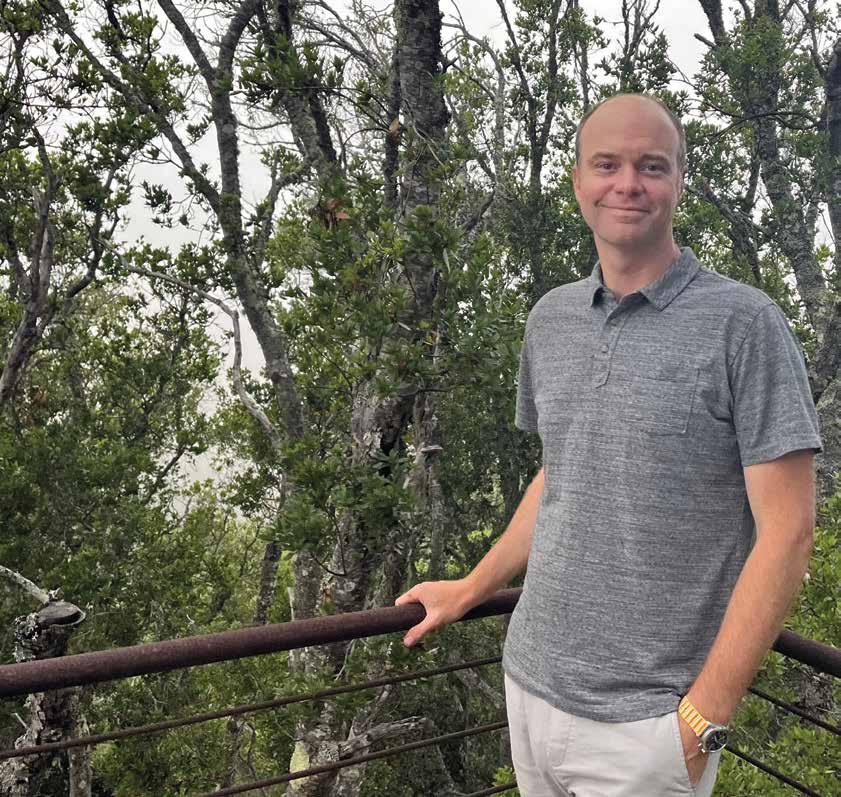WHEATON Carrying a legacy forward
Eliza Wheaton’s restored carriage embodies spirit of giving back
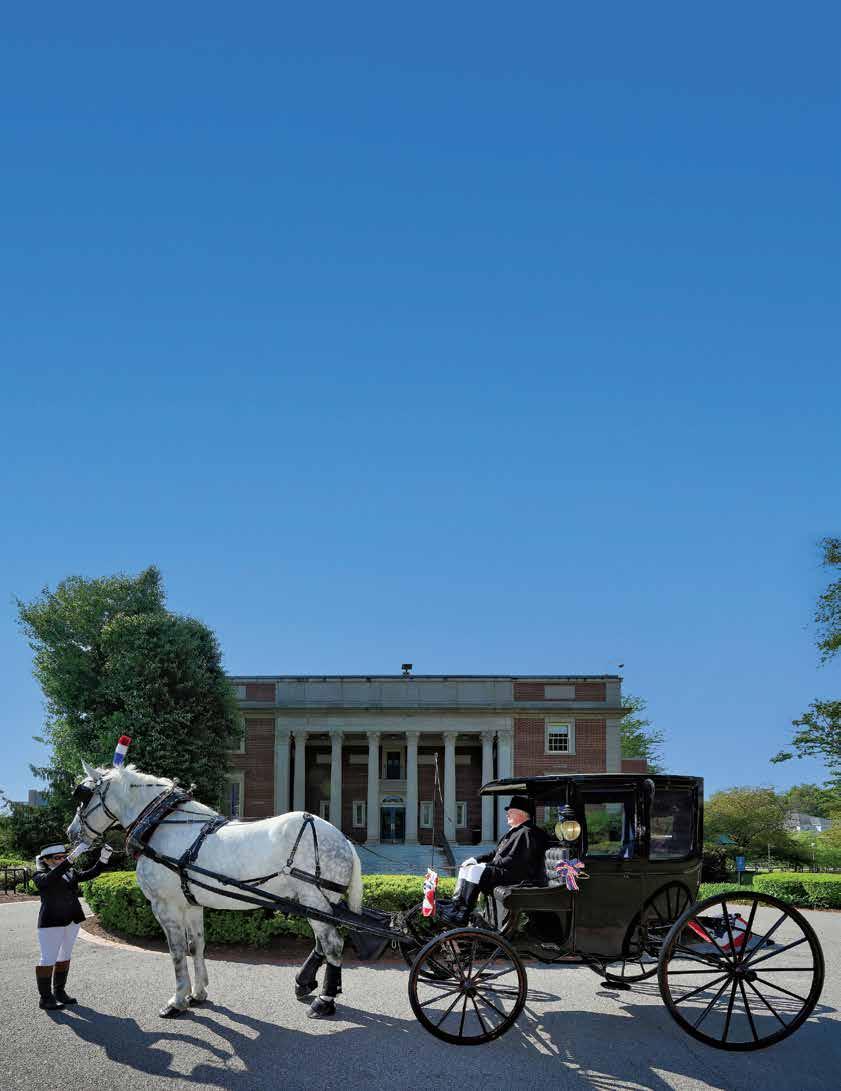
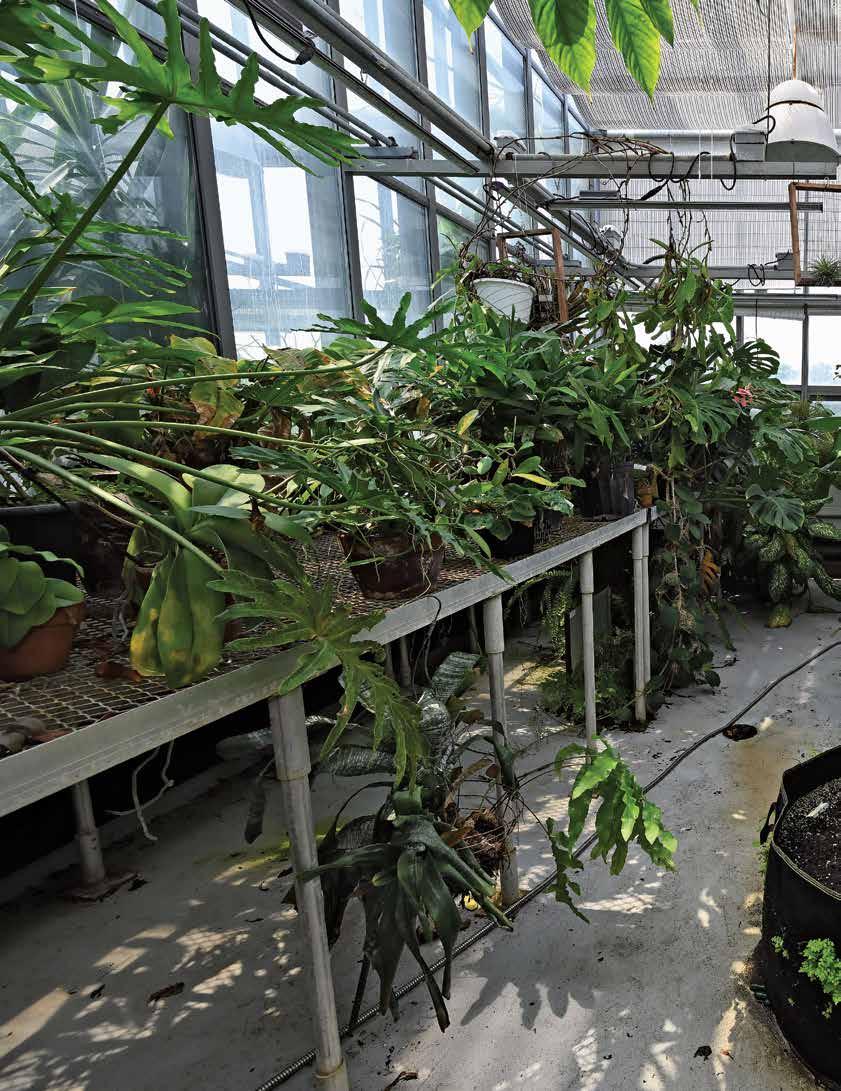

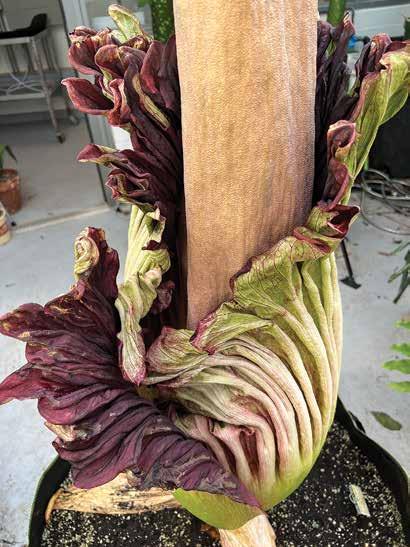







Plaster, steel, foam, clay, burlap, wire, wood, glue and a few other materials. How in the world does that end up a towering floor-tothe-ceiling dinosaur skeleton?
I find—especially at Wheaton—the answer to any question about transforming big ideas and big dreams is usually the same: education, experience, imagination and opportunity. The latter pairs perfectly with the kind of Compass Curriculum-encouraged passion that led Conary HowardRogers ’23 to create “Modern Incognitum, 2023,” a 115-by-214by-92-inch dinosaur that was on display this spring in the Beard and Weil Galleries as part of the 2023 senior art exhibition “(dis) connect: a moment in time.”
The annual capstone exhibition highlights the work of Wheaton’s senior visual art and design majors. Go online to see a gallery of other impressive art/big dreams successfully pursued. Before you do that just turn the pages of this issue of the magazine to see many stories that showcase examples: students winning national awards, philanthropists providing significant support to the college; faculty creating time and space to nurture their own
scholarship and creativity while building community on campus; graduates celebrating the walk across the stage and into the world ready to be changemakers; and alumni returning to campus to remind us all of the value of Wheaton’s liberal arts education and great possibilities.
Our cover story is about the ultimate pursuer of big dreams and big ideas—Eliza Baylies Wheaton and the college leaders who have followed in her footsteps to leverage the power of philanthropy and of giving back to the community, as symbolized by her restored carriage.
May your fall be fully focused on what you want in life. Ellen Murphy Warner ’69, who wrote The Second Half: Forty Women Reveal Life After Fift y (Brandeis University Press, 2022), offers some timeless advice about that in the profile written by Laura Pedulli.
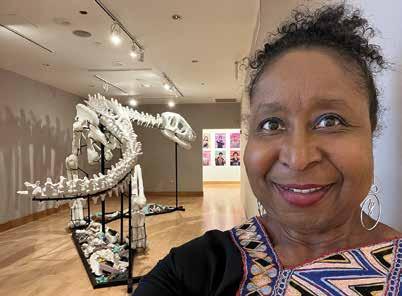
Enjoy.
Have a comment about the magazine or a story idea? Email magazine@wheatoncollege.edu
The story “Nursery school marks decades of research and care” in the spring issue of the magazine should have identified the student featured in a photo as Hailey Fournier ’24 (left), who is double majoring in secondary education and English.
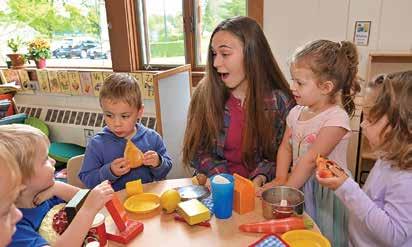
Vol. 113, No. 3
Director of communications and magazine editor
Sandy Coleman

Designer
David Laferriere
Multimedia producer Keith Nordstrom
Associate director of communications
Laura Pedulli
Marketing coordinator
Sophie Clarkin ’23
Assistant vice president of marketing and communications
Michael Graca
Vice president for marketing and communications
Suzi Robinson
Wheaton, The Magazine of Wheaton College (ISSN 1068-1558), is published three times a year (winter, spring and fall) by Wheaton College and printed by Lane Press of Burlington, Vt. Periodicals postage paid at Norton, Mass., and additional mailing offices. Postmaster: Send address changes to Wheaton College, Norton, MA 02766. Wheaton College © 2023
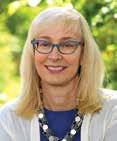

In August, colleges and universities across the country received guidance from the U.S. departments of Education and Justice on complying with the Supreme Court’s June 29 decision that ruled out the consideration of race as a factor in admission.
Wheaton’s admissions processes will not need to change as a result of this decision, since we assess each student holistically. The advice highlighted a fundamental truth that goes beyond admission decisions, however. “It is important that students—particularly those who are underrepresented—feel a sense of belonging and support once on campus,” the government’s guidance to colleges said. In other words, students need to feel that both the classroom and campus are places where they can share their perspectives, explore their ideas, and be themselves— and be supported in their education.
“Learning is enriched when student bodies reflect the rich diversity of our communities,” the federal agencies noted in their letter to higher education leaders. “Research has shown that such diversity leads to, among other things, livelier and more informative classroom discussions, [a] breakdown of prejudices and increased cross racial understanding, and heightened cognitive development and problem-solving skills.”
This inclusive excellence is the foundation of Wheaton’s strategic priorities and is essential to fostering our collaborative community, which in turn drives our transformative liberal arts education. The college’s commitment to diversity, inclusion and belonging already manifests itself in many ways across campus—LGBTQ+ Safe Zone training sessions, events such as the Martin Luther King Jr. Legacy Celebration and our Lavender and Posse graduation ceremonies, theme residences like SAFE Haüs and First Generation House, and campus organizations,
including the Diversity, Equity and Access Leadership (DEAL) committees that bring students, faculty and staff together to discuss issues and propose actions.
As a result, Wheaton’s reputation as an institution that welcomes a diverse community continues to grow. For example, the college earned a 4.5 out of 5 on the national Campus Pride rating for 2023, placing us among the top 20 percent nationally. More to the point, 25 percent of the incoming students for the Class of 2027 identify as Black, Indigenous and persons of color. An equal number are first-generation students. In addition, Wheaton College has been recognized by the National Association of Student Personnel Administrators’ Center for First-generation Student Success for our commitment to advancing outcomes for first-generation students. Wheaton is the only institution in Massachusetts to achieve the First Scholars designation and joins an exclusive cohort of 50 nationwide, highlighting our institutionwide approach to equity and success.
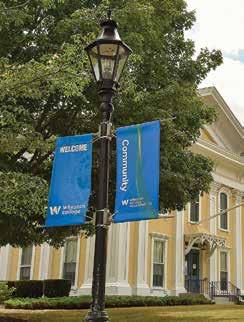
Our goal is not merely to sustain the progress that has been made, but to build upon it. This requires ongoing commitment, reflection and action. To better support these efforts, we have united the Marshall Center for Intercultural
Learning, the Center for Social Justice and Community Impact, and the Center for Religious and Spiritual Life together under the leadership of Associate Vice President for Institutional Equity and Belonging Luis Paredes. Wheaton is also a member of the Racial Equity and Justice Institute, a national consortium committed to identifying and implementing data-driven strategies to close racial educational equity gaps in higher education, and Paredes serves on their leadership team.
With the start of a new academic year, the college will cultivate an equity-minded emphasis to its work, which includes explicit goal-setting by administrative and academic units. By “equity minded” we mean to intentionally foster a deeper understanding of our community’s varied experiences and actively work toward eliminating disparities in access, success and resources. Another new initiative is the introduction of an Empower Bystander training program that equips students, faculty and staff to interrupt and intervene when bias incidents and prejudicial behavior arise.
In the spring of 2023, The Mellon Foundation awarded Wheaton a competitive $560,000 grant to support humanities-centered curricular pathways to change our thinking about race in health and medicine. Looking ahead, Wheaton will continue to introduce new ways of advancing our shared goals for a diverse and welcoming community. After all, creating a campus environment in which all students feel supported and a sense of belonging is very much in keeping with the principles of equity and access upon which Wheaton was founded as a female seminary nearly 190 years ago. More importantly, it’s fundamental to fulfilling the promise of a truly excellent liberal arts education for our students.
The Mellon Foundation has awarded Wheaton a competitive $560,000 grant to support humanities-centered curricular pathways to change how we think about race in health and medicine.
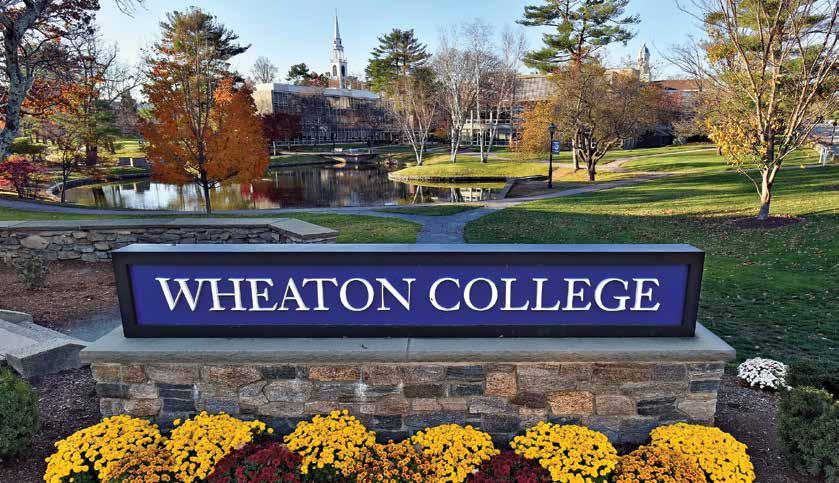
Wheaton’s proposal “Transforming the Future of Health Education: Centering Race and Medical Humanities” aims to provide the opportunity for students, faculty and institutions of higher learning to understand the role that race, cultural backgrounds and global perspectives play in the study of health and medicine and in the equitable delivery of health care.
“This grant will allow Wheaton humanities faculty to develop and share their expertise with other educators on two cutting-edge areas that are shaping our health care futures—storytelling and the use of digital tools in understanding needs and providing service,” said M. Gabriela Torres, Wheaton associate provost and principal investigator on the grant.
“It will give Wheaton students new social justice-focused opportunities to learn about the ways that race and
racialization shape the quality of health care and limit our ability to truly understand and act to address the most challenging issues of human health,” she said.
Humanities include the study of history, modern and classical languages, literature, culture, visual and performing arts, religious studies and philosophy— examined through a lens that focuses on our shared human experiences.
“At Wheaton, the grant will create new courses, minors and experiential opportunities that better prepare our students to critically engage with the legacies of slavery, racial bias and inequality that impact the understanding of health, human biology and health care,” said Torres, professor of anthropology.
During the next three years with the Mellon Foundation support, Wheaton humanities scholars plan to lead faculty collaborations aimed at transforming health education at Wheaton and beyond. The work will expand the curriculum with new courses and teaching materials as well as create new Liberal Education and Professional Success
(LEAPS) and sophomore experiences; and prepare students to enter health and medical fields by equipping them to better serve diverse and underserved populations. It also will position professors as leaders in carrying out the college’s goals for diversity, equity, inclusion and belonging.
Wheaton plans to create 10 free-to-use learning modules that can be shared with other colleges and universities for educators to explore race as a layered foundation of health sciences. Postdoctoral fellows, also funded through the grant, will bring to campus their expertise in global narratives and help students build skills in digital health humanities.
“Health care today requires understanding that human health narratives are undeniably global. If the pandemic taught us anything, it is that. Reading or acting on global knowledge requires an expanded humanities skill set to understand human cultural and geographic differences that this grant will help us bring to students,” Torres said.
—Sandy ColemanMembers of the Wheaton community gathered in April in the Balfour-Hood Campus Center to celebrate the late Frances A. Shirley, professor emerita of English, and dedicate a commons area in her name.
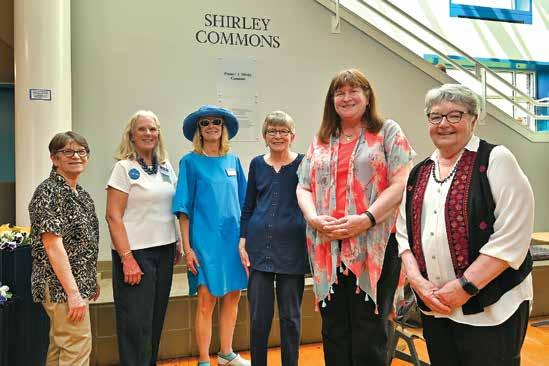
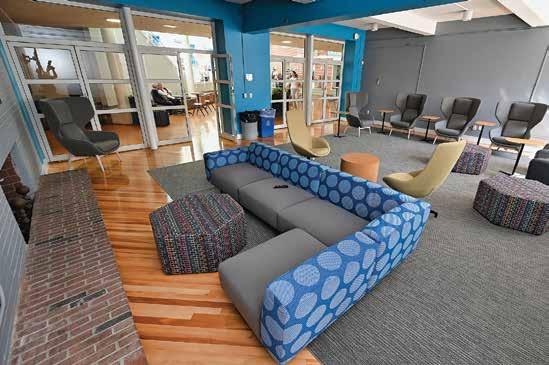
“The Frances A. Shirley Commons honors not only Fran’s dedication to her students and her scholarship, but it also recognizes her generous philanthropy to Wheaton College,” said former Provost Touba Ghadessi in her remarks during the ceremony.
Shirley began teaching in Wheaton’s English Department in 1960. She taught at the college for 35 years, served as chair of the English Department, assistant dean and associate provost. In 1980, she was awarded the A. Howard Meneely Research Professorship. A notable Shakespeare scholar, she also wrote the book Swearing and Perjury in Shakespeare’s Plays, and edited books on Shakespeare's Troilus and Cressida and volumes on King John and Henry VIII
She made a gift to Wheaton every year she taught at the college, totaling $1 million in her lifetime. During her career, she invested in 37 charitable gift annuities that supported her through her retirement years and then were left to Wheaton in her will.
In all, Shirley’s philanthropy to Wheaton totaled $8.5 million—creating endowments for four scholarships and an internship for students pursuing theatre studies and dramatic literature; establishing a fund to support multiple professors of practice in the humanities and in the business and management program; and funding to furnish and refurbish multiple common spaces in the Balfour-Hood Campus Center.
“The impact of her generosity will be felt by generations of Wheaton students and educators,” said Ghadessi. “Fran’s generosity was fed by her belief that a liberal arts education is one of the most important investments we can make in our lives, and that Wheaton College enacts this education in innovative and inspiring ways.”
Wheaton Board of Trustees Chair
Janet Lindholm Lebovitz ’72 led a toast to Shirley, noting, “Events like this give us an opportunity to reflect on the many qualities that make Wheaton such a unique place, and to pay tribute to a member of our community who gave so much to the college. Frances Shirley truly embodied the spirit of Wheaton—as a teacher, colleague and friend.”
—William WalshWatson Fellow will seek lessons from survivors of trauma
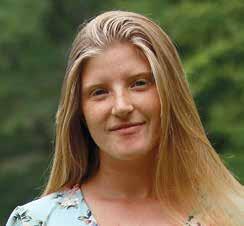
Agathe Mwehu ’23 has been awarded a 2023 Thomas J. Watson Fellowship to spend a year traveling to explore how survivors of horrific acts not only remain resilient but also thrive. Mwehu’s project, “Finding Hope: The Stories of Survivors,” will take her to Rwanda, Kenya, Colombia, the United Kingdom and Sri Lanka to meet with people and organizations to gain an understanding of how survivors of trauma heal and recover their sense of hope. Her goal is to harness the power of sharing experiences.
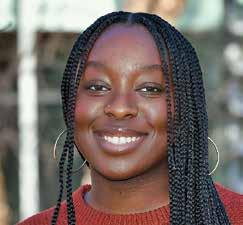
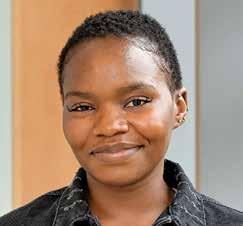
“Sharing trauma can be overwhelming, causing anxiety and discomfort. However, that sharing provides an opportunity for one to find relief and leads to some measure of resolution,” she said.

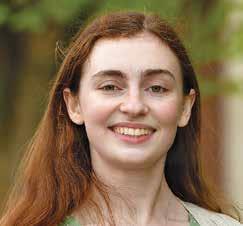
Karen Almaraz ’20, Erica Drufva ’23, Anna Fairbairn ’22 and Margaret Gould ’23 have been awarded Fulbright English Teaching Assistant scholarships that will take them into classrooms abroad with local teachers as they also serve as cultural ambassadors for the U.S. Almaraz, who majored in anthropology, is headed to Argentina. Drufva, a double major in international relations and Hispanic studies, will teach in Spain. Fairbairn, who double majored in anthropology and Hispanic studies, will teach in Guatemala. And Gould, a first-generation college student who triple majored in European history, secondary education and German studies, is going to Germany.
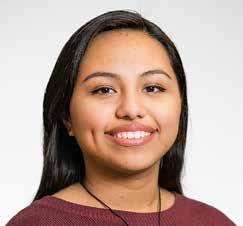
Nafissatou “Nafi” Sall ’24, an aspiring Foreign Service Officer who is double majoring in international relations and French, already speaks two languages (English and French). And now she is on her way to mastering a third, Portuguese, after winning a competitive Critical Language Scholarship from the U.S. Department of State. The award provides an opportunity to spend eight weeks in Rio de Janeiro, Brazil, studying Portuguese in a language and cultural immersion groupbased program. Fewer than 10 percent of Critical Language Scholarship applicants are accepted to participate, according to Alida Gomez, associate director of Wheaton’s Center for Global Education.
Go online to read more.
Esther Avalos Flores ’25 was born and raised in Santa Tecla, a small city in El Salvador. While in middle school, she and her parents would travel to the countryside each spring with their church group to work with volunteers from Canada and the U.S. to help build houses for farmers and others.
“Those experiences provided a glance at the routine of farmers, and the importance of soil for them and all of us,” Avalos Flores said. “Soil keeps us in place, feeds us and is the place where we stand; if we don’t take care of it, life will perish.”
This summer she returned to El Salvador to help farmers take care of that precious resource as a 2023 Projects for Peace award winner. The Wheaton sophomore hopes her project, “The Soil Under Our Feet, El Salvador,” will help address
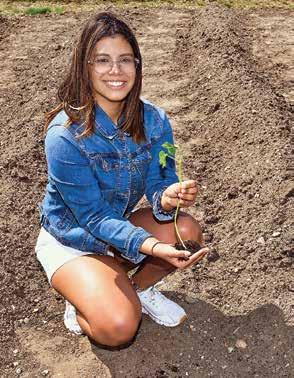
food insecurity and soil contamination from pesticides and fertilizers, which she said are major issues in the country.
“I feel enthusiastic about connecting two important parts of my life: my academic life and my life back home,” she said.
Avalos Flores, an international relations major, partnered with environmental experts and farmers to provide strategy workshops on soil enrichment and fertilizing techniques for farming families and urban ecological workshops for students living in Santa Tecla. Session topics ranged from how to treat or recover damaged soil to how to create organic fertilizers and homemade orchards.
The Projects for Peace grant is possible thanks to funding from the late Kathryn Wasserman Davis, who was the mother of Diana Davis Spencer ’60.
When she arrived at Wheaton as a firstyear student, Eleanor “Ellie” Guerin ’23 already had her life journey mapped out.
“I came in wanting to pursue a degree in psychology and knowing I wanted to work with children. I was dead set on going straight into graduate school upon completing my undergrad,” she said. “Then I started working at the Elisabeth Amen Nursery School on our campus and absolutely fell in love. I found myself considering what it would be like to teach for a few years before continuing my education.”
Now, because of that hands-on experience, she will have a chance to explore the idea. Guerin has been accepted into Teach For America. She will be teaching
elementary school, with the flexibility to also teach English as a Second Language in Rhode Island.
Teach For America is a nonprofit that recruits a national corps of individuals who commit to teaching in low-income communities.
“I am beyond excited for this opportunity to join a collection of like-minded individuals devoted to educational equity, while simultaneously working hands-on to promote that equity as a classroom teacher,” Guerin said.
Since 2021, Guerin has worked at the nursery school. Last fall, she was a teacher’s assistant and observed children as part of her research capstone.
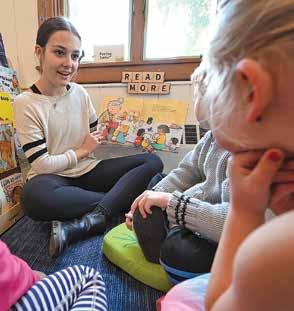
She noted that the Teach For America
“Peace for me means that everyone has the chance to prosper in healthy ways and cooperation is key to achieving prosperity,” Avalos Flores wrote in her proposal.
—Sandy Colemanexperience will better prepare her for pursuing a Ph.D. in clinical psychology.
—Sandy ColemanAspiring teacher Renina Wynn ’24 spent two weeks during winter break observing, assisting and teaching in a high school as the recipient of a Boston Urban Teaching Fellowship.
She secured funding for the winternship through the Nancy Lyon Porter ’43 Community Service Fellowship, which is coordinated through Wheaton’s Filene Center for Academic Advising and Career Services.
Wynn—a double major in history and secondary education—was placed in a 10th grade English class at John D. O’Bryant School of Mathematics and Science, an honors high school in Roxbury, Mass., a Boston neighborhood. She observed the teacher and students; helped reorganize the school’s book room; and assisted students with their writing.
Her mentor teacher, Cole Moran, provided guidance and support throughout the fellowship, along with Wheaton Professor of Education Scott Gelber, who coordinated the program and led learning sessions that complemented the hands-on experience.
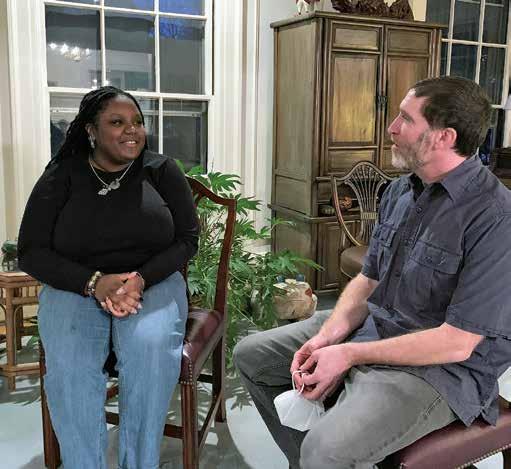
“My mentor teacher really took me under his wing during my time at O’Bryant. I not only got to see how he interacted with students and taught, but also what he did behind the scenes; such as grading and lesson planning. He also challenged me to lead a short discussion at the start of class and help students with paper revisions,” she said.
The most fulfilling part of the experience for Wynn was witnessing how the teachers interacted with their students in a positive, impactful way.
“Most students were engaged and excited to learn from Moran without him being strict toward students. I think that’s really important and something I hope to take with me into my career. Of course, academics are important, but students are human and have a lot to deal with outside of school. I learned from Moran that teachers can be both patient and still have high expectations for their
students,” Wynn said.
The fellowship builds on Wynn’s other off-campus experience as a writing intern at the Boston International Newcomers Academy, a public school that embraces new immigrant adolescent English language learners and their families. Her Wheaton courses “Teaching English Language Learners,” “Education and Equality in the U.S.” and “Adolescent Development” also supplied her with the knowledge to succeed, she said.
Throughout the fellowship, Professor
Gelber facilitated meetings with Wynn and students from other local universities and colleges participating in the program. He said her experiences at the John D. O’Bryant School and the Boston International Newcomers Academy broadened her perspective of the education field.
“During our reflection sessions, Renina enriched the conversation by comparing and contrasting those settings. This range of experience will improve Renina’s effectiveness as a teacher while also strengthening her job applications when that time comes,” he said.
For Wynn, who plans to obtain her teaching license, the winter fellowship also has exposed her to postgraduate and networking opportunities.
—Laura PedulliThe most fulfilling part of the experience for Wynn was witnessing how the teachers interacted with their students in a positive, impactful way.

Emmanuel Leal’s journey through Wheaton helped him harness his passion and set the stage for a promising career in design. Thanks to the college’s Compass Curriculum and faculty and staff who connected him to growth opportunities, he was provided with the freedom and support to develop his personal interests and skills. In May, the senior became the college’s first student to graduate with a major in design, which was launched in fall 2022. Before graduation, Leal talked with writer Laura Pedulli about his Wheaton experience.
“I have the Posse Foundation to thank for bringing me to Wheaton. I chose Wheaton for its visual art program. I wanted to be an artist and was debating between doing computer animation or video game design. Both the graphic design and animation courses caught my eye.
“I enjoyed the fact that I wasn’t required to only take courses in fine arts, communications and animation. I could take any
courses under the umbrella term of visual art, which was amazing. I took classes in production, which led me to also major in film and new media studies.”
Why did you decide to pursue a design major?
“I always knew I wanted to be an artist when I grew up. That’s why my first semester I declared my major in visual art, as the design major wasn’t yet an option.
“I started to make the shift from being a mixed-media artist to working in digital art, using the studio art app Procreate. For the art portion of the course ‘Addressing Inequality in America,’ taught by Associate Professor of Art Kelly Goff, Professor of Sociology Karen McCormack, Associate Professor of English Winter Jade Werner and [then] Assistant Professor of Political Science Lindsay Flynn, I created a poster for mental health awareness that would be applied to one of the satellite dishes of the [college’s] whispering gallery.
“That project created a butterfly effect
in entering the realm of design. Kelly showed my final project to Jessica Kuszaj, Wheaton’s associate director of arts events and publicity. I happened to be in the building when this conversation took place. As Kelly left Jessica’s office, he ran into me, and just as quickly went back [with me next to him] and introduced me to Jessica. That is how I got my job as a student designer for Arts at Wheaton.”
“I’ve enjoyed being able to see my artwork and projects all around campus, including in the Mars Arts and Humanities building and Wallace library. Most recently, my project on the representation of different marginalized communities was featured on the walls of Beard and Weil Galleries. What I’ve enjoyed the most are the connections I’ve made—particularly with the staff and faculty.”
Go online to read the full interview and view Leal’s design portfolio.
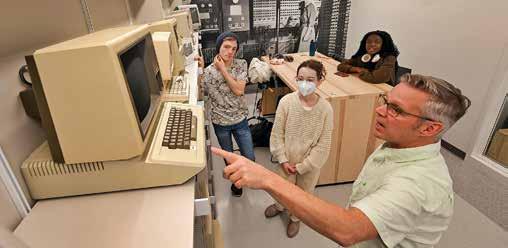
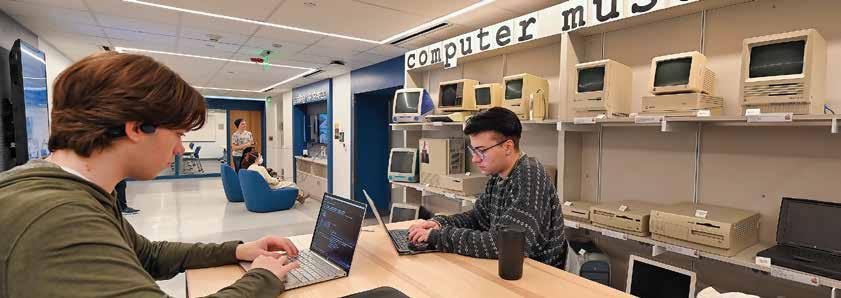
When Professor of Computer Science Mark LeBlanc began working at Wheaton in 1993, Mosaic, one of the first web browsers, launched; the internet was beginning to become available for general use via commercial service providers; and the MP3 file format that is used to play and store audio was first released.
Things have come a long way since then. Just ask Siri or Alexa. LeBlanc is making sure we never forget that with the computer museum that he created with cohorts of students and is now reinstalled with the help of computer museum curators Hanna Ondrasek ’26 and Samuel Chisholm ’26.
Not only is the museum a display of the professor’s passion and a teaching tool, it also is an opportunity for hands-on work/study and internship experience for students like Ondrasek and Chisholm.
“In the fall of 1993, I had just started at Wheaton and the department had some old cool wooden display cases, so I started displaying old calculators, memory chips, books and other items. When there was more display space, that grew into installations featuring early Macs and early Windows computers,” LeBlanc said.
“I never had computers or gaming stations growing up. But I intersected with computing in college as a first-year student in 1980 and since then, I have been fascinated with tech, but not for the latest and greatest. Instead, I have a love
[and respect] for the old,” he said.
LeBlanc describes Wheaton’s collection as a “micro-computer” museum, featuring personal computing technology from the 1970s and after, as well as a range of calculating devices. One of the older computers on display is the original IBM PC running DOS v1.1 [“originally the price of a car in the early 1980s”], he noted.
The museum underwent a makeover during renovations of the Diana Davis Spencer Discovery Center Dedicated to Free Speech and Innovation and all the items were stored in shrink-wrap. Now, they are on the shelves of a brightly lit space designed for students to hang out at a table and soft seating, learn in nearby
classrooms and play vintage video games on two large screens.
Ondrasek, who plans to major in computer science, has worked with Chisholm to determine how to organize the museum.
“It is really insane to me how far technology has come, and I am reminded of that fact every time I work in the computer museum,” Ondrasek said. “Some of our earliest computers had release prices that would be the equivalent to over $3,000 today, yet were only capable of simple word processing and had incredibly low memory. It really makes me appreciate the incredible capabilities and the ease of use of computers today.”
—Sandy ColemanIn a big city, navigating public transportation, managing apartment living and expenses, and balancing work and a social life hold major real-world lessons as well as challenges. They all translate into important building blocks for professional and personal success.
Each academic year, a cohort of Wheaton students leave the Norton campus to embark on this educational journey of independent living, work, play and self-discovery in Boston through the Semester in the City program.
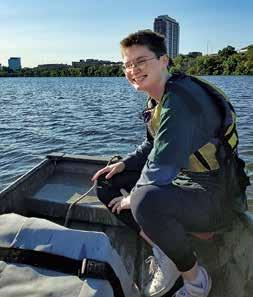
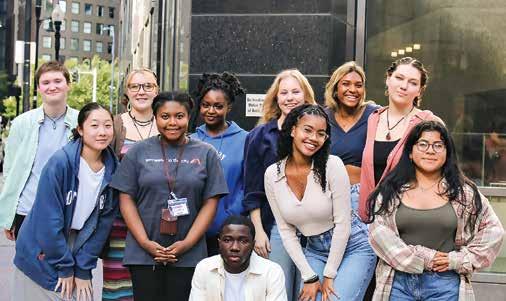
Semester in the City is an immersive experience offered through the Bostonbased College for Social Innovation. Wheaton is one of a dozen college partners throughout New England. Students earn academic credit while working 30 hours per week in internships in the social sector and taking two courses that teach skills and the mindset necessary for success in the workforce. The program also fulfills the Sophomore Experience requirement, which is a core component of Wheaton’s Compass Curriculum.
“A program like Semester in the City is critical for students as it offers extensive practicum experiences, which is closely aligned with Wheaton’s new initiative on Life and Career Design,” said Srijana Shrestha, associate professor of psychology and the Wheaton program coordinator. “Through this program, when students work closely with social impact sector organizations, they gain valuable experiential learning and also expand their professional network, which can be instrumental in career development.”
Wheaton’s first cohort started in fall 2017. So far, 113 Wheaton students have participated and have completed projects that have made lasting impacts on the
work of organizations throughout Greater Boston. During the 2022–23 academic year, 25 students were fellows.
“It’s essential to try your hardest to push yourself to get out of your comfort zone. If you do, you will see what else you are capable of and you may even surprise yourself,” said Anna Foster ’25, a sociology major who was a school partnership fellow at St. Stephen’s Youth Programs in Boston.
“This program wants you to try new and challenging things. What is most important is that you remind yourself you are not alone; your mentors, other fellows and the program’s staff are here to help you navigate the challenges,” Foster said. Seeing the connections forming and helping to facilitate all of the
transformative moments is what Dolita Cathcart, chief program officer for the College for Social Innovation, said she enjoys about working with Semester in the City.
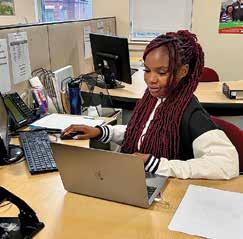
“I feel the program is making a real difference for our student fellows—a difference the staff and internship sites recognize, a difference the students feel and acknowledge and a difference their home institutions witness when the students return to campus,” said Cathcart, Wheaton associate professor of history who is currently on leave to serve in the College for Social Innovation role.
—Sandy Coleman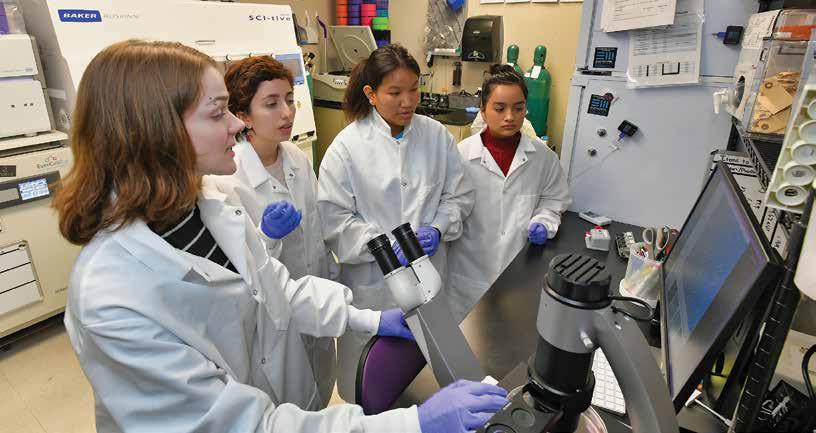
In a small state-of-the-art laboratory, Nyima Bhuti ’25, Prabidhi Malla ’26 and Rawan Abushanab ’26 donned lab coats and got to work.
On that afternoon last November at EverCell Bio, a startup biotech company based in Natick, Mass., the three Wheaton students practiced various cell culture techniques. They used handheld pipettes to collect cells from petri dishes, which they then counted using a sample under the microscope. Afterward, they vialed the cells and moved them to the freezer.
The lab experience offered these students the chance to both apply their scientific knowledge in a real-world environment and connect with the company’s owner and founder, who happens to be an alum: Philip Manos ’08. The students also benefited from the wisdom and experience of another alum, EverCell Bio scientific associate Jessica Morris ’21, who instructed them in the lab work.
The students visited EverCell Bio, a company focused on stem cell research,
through Wheaton’s Business and Management Department.
The class included both the lab experiences as well as on-campus visits from Manos, who graduated from Wheaton with an independent major in psychobiology.
“Having this opportunity to come and see how researchers work at a biotech and shadow them has been very beneficial, especially for someone like me who wants to work in biotech in the future,” said Abushanab, who plans to double major in bioinformatics and data science (an independent major).
“This is also a great opportunity to learn about what it’s like to be an entrepreneur from Phil, who is both a scientific researcher and business owner,” Abushanab said.
Malla echoed the sentiment: “This experience has allowed me to not only work with lab resources, but also to grow my network and essentially help me understand what exactly I want professionally for my life.”
Bhuti, who also is majoring in biology, added that the experience showed her how to apply the concepts she has learned in a setting outside of the classroom and campus lab.
Morris said the field experience has helped the students gain confidence in the lab.
“Everyone was a bit nervous working with live cells in a biosafety cabinet at first, but over the past few weeks they’ve already been getting more comfortable with it,” she said, adding that she was struck by how well the three students have supported each other’s learning.
Morris began her role as a scientific associate at EverCell Bio shortly after graduating with a bachelor’s degree in biology. She said working so closely with Wheaton and another alum has strengthened her connection to the college. “It’s empowering to be able to teach and help further the early careers of students in the same position that I was in just four or five years ago.”
—Laura PedulliAllison Darling ’26 is just beginning her Wheaton journey, but she already is gaining valuable laboratory skills that will give her an edge in a future career in medicine.
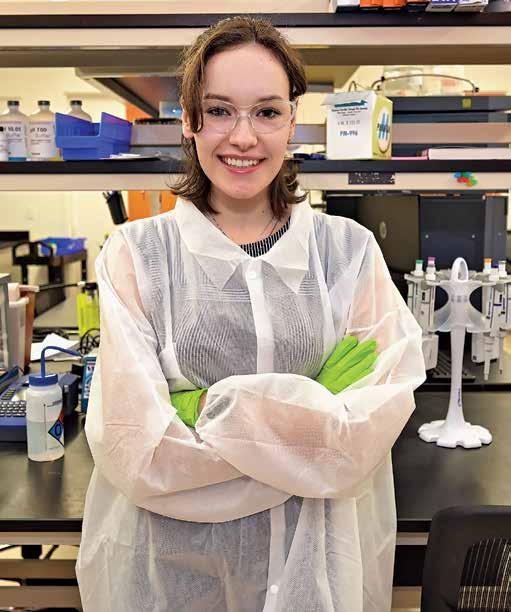
Since November 2022, Darling has served as an intern at Phenomenex, a California-based scientific company that has a laboratory in Mansfield, Mass. She has been learning essential aspects of running a lab: from managing inventory and safety procedures to gaining hands-on experience with techniques like instrumentation and initial calibration assays.
“So far, I have learned a lot about the machines in our lab and how they work; machines like mass spectrometers, HPLCs, NanoDrop Microvolume Spectrophotometers, pH meters and cell culture hoods. I also have gotten to lead several projects regarding inventory and organization,” said Darling, who is double majoring in neuroscience and French.
“As the lab sets up, I am organizing and categorizing, but I am really learning about what it means to be a scientist,” she said.
Darling’s placement at Phenomenex is part of a partnership between local biotech companies, including EverCell Bio, and Wheaton’s Biology Department and Social Entrepreneurship Program.
Darling is learning from Phenomenex’s scientists, who specialize in the characterization and separation of various biomolecules. The lab’s projects use cutting-edge technology to drive innovation in the drug discovery field.
The position fits well into Darling’s long-term goal of becoming a doctor. Her aspiration stems from personal experiences with neurological disorders.
“I have had three major concussions, been diagnosed with vestibular migraines, and have seen the clinical process through it all. Although, this time, I’d like to be on the other side of things,” she said. “In addition, my best friend was diagnosed with a brain tumor, and another friend had anxiety/depression—two very different
things but both have to do with the brain. I see the brain as a puzzle and I want to help find solutions when things go wrong.”
With her French major, Darling hopes to develop fluency in the language so she can someday pursue a career with Doctors Without Borders, or Médecins Sans Frontières, and provide medical treatment to those in impoverished and war-stricken countries.
Darling said the most meaningful part of the Phenomenex internship is knowing that she is starting to make that dream come true.
“I know that these are the first steps in my path to going to medical school, joining Doctors Without Borders, traveling the world and doing all the things I love. That is the most gratifying part,” she said.
—Laura PedulliEven as this introduction was being typed, artificial intelligence (AI) was pointing out misspellings and finishing sentences. And when ChatGPT was asked to produce interview questions for this Q&A session with Professor of English Lisa Lebduska, the Open AI tool did so within seconds. With the rapid advancements in AI and the media attention ChatGPT is generating because of its human-like capabilities, Wheaton professors have been discussing pedagogical opportunities, as well as concerns, and how to address drawbacks. In May, Professor Lebduska facilitated the workshop
“ChatGPT, Digital Assistants and Writing” as an overview for faculty and staff. She is one of many professors engaging AI as a teaching tool and offering workshops on the subject. Wheaton magazine editor Sandy Coleman asked her some questions.
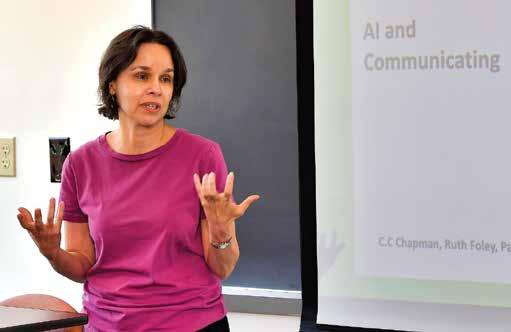
Tell us about the discussions you have held regarding AI and ChatGPT.
“Senior Professor of the Practice of English Ruth Foley; Senior Professor of the Practice of English Angie Sarhan and I have offered a faculty brown bag lunch on ChatGPT and a May workshop on the broad category of AI tools, which involved several colleagues, including Professors Patrick Johnson, C.C. Chapman and John Partridge. I've been keenly aware of AI since last summer because it is so central to the teaching of writing and rhetorical analysis. Students in my ‘Advanced Writing’ class designed their own writing prompt for ChatGPT and then evaluated the output. I also have distributed a ChatGPT essay and asked students to evaluate it, employing the criteria we have used for peer review.”
“I'm thrilled at the potential of it to expand our ability to think creatively and critically and perhaps alleviate more tedious components of work. I'm concerned about the potential loss of jobs and AI’s abilities, as with all technology, to intensify systemic social inequities and injustices while masking them. I'm troubled by its potential to disrupt democracy through the creation of
deep fake sound and audio, to ‘hallucinate’ [fabricate information, including citations], combined with the ability to ‘personalize' misinformation on a massive and rapid scale.”
“It can help writers who feel stuck to get started, help them to organize their thoughts and serve as a grammar and spelling check. Over time, these features might help writers to learn more direct phrasing or even the discourse of a new discipline as they read AI output.
“AI tools also can allow faculty and students to analyze the aspects of these tools that consumer models render invisible. How do they work, how can they be rendered more equitable, what are they missing? What does it mean to ‘write’ and how does the very act of writing—including its difficult moments—help a person to grow?
“The challenge will be for faculty to consider at which points in the creating/ writing process do we want students to try to generate something on their own. At which points is struggle a valuable and desirable outcome? Do we want students to use AI to help generate ideas? To help
organize? To provide sources? To edit and polish? These are complex questions for each and every discipline, and they are directly related to the foundational questions of writing across the curriculum. In many ways, the questions connected to AI in the classroom are the questions of writing across the curriculum for the 21st century.”
What needs to be done to maintain the spark of creativity in light of ChatGPT and other AI advancements?
“I would venture that the first step involves motivating students and signaling to them that they have something to say, something to think. We can reinforce the idea that expedience isn't always desirable, and that we value other aspects of creation, discovery and communication. We need to engage in responsible information literacy instruction, emphasizing that the world of knowledge and possibility is even larger than what the AI yields. There is a difference between possessing information and having understanding. If we can make those messages prominent, we will have succeeded.”
Go online to read the full interview.
Delvyn Case, professor of music, was honored with a screening and discussion of his solo cantata “The Binding of Isaac According to the Elohist,” which was hosted by The University of Cambridge Faculty of Divinity in May. His interfaith musical projects also were featured at the national conference of the International Council of Christians and Jews in June.
Andrew Davinack, assistant professor of biology, wrote the article “Can ChatGPT be leveraged for taxonomic investigations? Potential and limitations of a new technology” published in the journal Zootaxa in April. He also co-wrote “First genetically confirmed report of the Japanese mystery snail, Heterogen japonica (Martens, 1861) from California more than a century after its first introduction” published in BioInvasions Records in March. Ashley Barreto ’26 was one of the co-authors. Davinack also won a General Biodiversity Research Grant from Nantucket Biodiversity Initiative in May. The research grants support projects that expand knowledge of understudied taxonomic groups and the overall biodiversity of Nantucket, Tuckernuck and/or Muskeget islands.
Claudia Fieo, professor of visual art, exhibited her artist book “a scaffolding for living” in the show “Edge of the Ocean” at the Sanford Gallery in Florence, Mass., from May 19 through June 17. Fieo’s artist book of collagraph prints folded into a sculptural interlocking pattern, “Concurrent Currents,” was

accepted in a juried exhibition of works at the Cahoon Museum of American Art from April 18 through June 18. The show also included her relief print “And so it goes…”.
Tommasina Gabriele, professor of Italian studies, wrote the blog post “The Asexual Awakening: ‘Breasts and Eggs’ by Mieko Kawakami” for Oxford University Press in May.
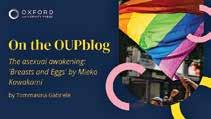
Nancy Kendrick, professor of philosophy, cowrote with Jessica Gordon-Roth ’04 the chapter “The Visible and the Invisible: Feminist Recovery in the History of Philosophy” published in Recovering Women's Past: New Epistemologies, New Ventures (University of Nebraska Press, 2023). Gordon-Roth is an associate professor of philosophy at the University of Minnesota.
Katherine Mason, associate professor of sociology/women and gender studies, wrote The Reproduction of Inequality: How Class Shapes the Pregnant Body and Infant Health (NYU Press, 2023).
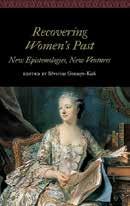
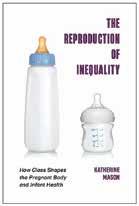
Cheryl Mrozowski, professor of dance, was invited to conduct an external review of the visual and performing arts at Stonehill College in Easton, Mass., in May and write an evaluation of the visual and performing arts curriculum.
Srijana Shrestha, associate professor of psychology, and her research team at University of California, San Francisco, and Possible Health in Nepal, were awarded a R01 research grant by the National Institute for
Mental Health for a hybrid implementationeffectiveness study of BECOME (BEhavioral Community-based COmbined Intervention for MEntal Health and Noncommunicable Diseases) delivered by community health workers in Nepal. Shrestha is a co-investigator on the five-year project.
A. Javier Trevino, professor of sociology, wrote the article “Talcott Parsons on Building Personality System Theory via Psychoanalysis” published in the Journal of the History of the Behavioral Sciences in April.
Sam Kestenbaum ’09 won a third-place 2023 American Academy of Religion Journalism award for Best In-Depth Reporting on Religion. The writer’s work has been published in The New York Times, The Washington Post, Rolling Stone magazine and other media.
Ted Nesi ’07, an investigative reporter and politics/business editor at WPRI-TV in Providence, R.I., and three of his colleagues shared a regional Edward R. Murrow Award for Investigative Reporting from the Radio Television Digital News Association.
Ret Talbot ’93, a freelance journalist who covers ocean issues, co-wrote Chasing Shadows: My Life Tracking the Great White Shark, about the resurgence of the white shark population in New England waters (William Morrow/ HarperCollins, 2023).
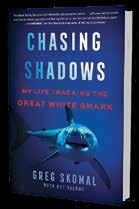
The Department of Athletics and Recreation inducted six individuals, two teams and a former coach into the 2023 Athletics Yowell Hall of Fame at a ceremony held during Commencement
Reunion Weekend in Emerson
Gymnasium. They are Allyson Aube '95 (basketball), Christine Whelan Miller '95 (basketball), Oscar Medina '97 (soccer), Dina Terceira Swanson '99 (softball), Beth Castagno Marks '00 (track and field) and Christiana Butera '12 (synchronized

swimming). Also the late men’s soccer coach Matt Cushing, the 1981 women's lacrosse team and the 2012 baseball team were inducted.
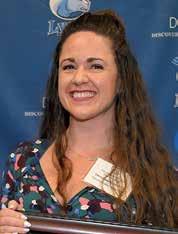
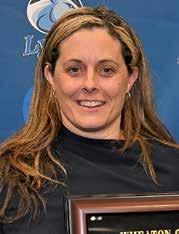
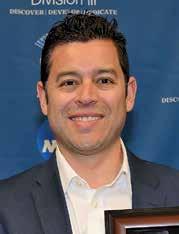
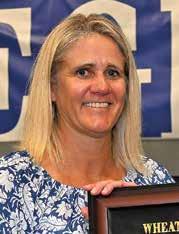

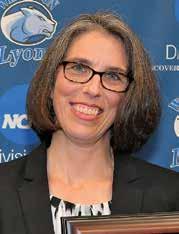
The honors give lasting recognition to individuals who, either through participation,
support or interest, have made outstanding contributions in the athletics arena, and specifically to the Wheaton athletics program. The individuals and teams selected have not only brought recognition, honor, distinction and excellence to the college and its intercollegiate athletics program, but they also have continued to demonstrate in their lives the values imparted by intercollegiate athletics.
Go online to read the full details of their accomplishments.
The Lyons captured the NCAA Division III Regional Tournament title for the fifth time in school history with a win over Mitchell College in New London, Conn., on May 12. Wheaton advanced to the NCAA Super Regional, where the team won the opener of a best-of-three series with No. 1 Johns Hopkins University in Baltimore, before bowing in the next two games to end the season with a 42–9 record. The Lyons tied the school record for victories and finished the season ranked 10th in the final Collegiate Baseball/American Baseball Coaches Association national poll and 11th in the D3baseball.com survey.
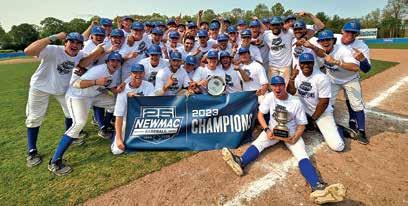
Some members of the 2012 men’s baseball team and coaches (from left to right): Kevin Foley ’14, Nolan Corr ’12, Chris McCormack ’15, John Keating ’12, Zach Brown ’02 (assistant coach), Dan Demeo ’12, Eric Podbelski (head coach), Peter Pasquarosa (assistant coach), Hal Landers ’12, Apolinar De La Cruz ’15, Brian Mylett ’15, Ryan Grant ’14, Justin Peluso ’15, Stefan Sunda ’14, Mike Gibbons ’16
Hall of Fame attendees from the 1981 women’s lacrosse team, coaches and other staff members (from left, back row): Gayle Olson (former head athletics trainer), Rebecca Kettelle ’81, Beau Doherty (assistant coach), Drusilla “Drusie” Colby Milford ’82, Sarah-Jane Vokey ’84, Susannah “Susi” Gardner ’84, Deirdre Corcoran Foote ’82, Julie Engebretson Taylor ’81, Ellen Van Pelt Jordan ’81, Beth Peterson Wahlig ’81, John P. Hill (head coach). Front row: Pam Danforth ’81, Jane Beezer ’81, Carolyn Crowley Stimpson ’81, Susan Homma Ganio ’82, Claudia Friese (team manager)
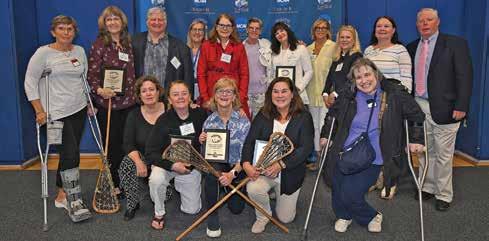
In June, Head Baseball Coach Eric Podbelski was named the American Baseball Coaches Association/ATEC 2023 Region 1 Coach of the Year. The ABCA/ATEC Regional and National Coaches of the Year are selected by members of the ABCA All-America and Coach of the Year committees in nine divisions.
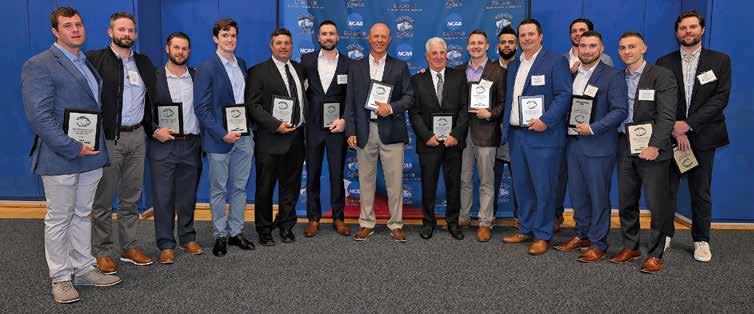

Elizabeth Bernardy ‘20 has been named the head coach for both the men’s swimming and diving and women’s swimming and diving programs. She joins Wheaton after a two-year stint as an assistant coach at Smith College.
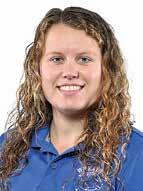
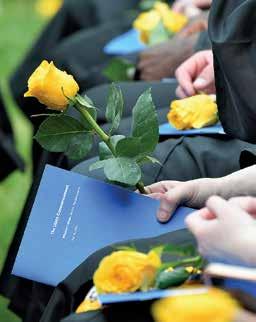
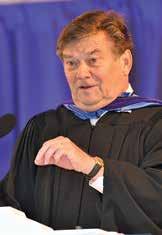
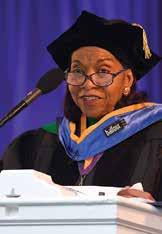
Wheaton President Michaele Whelan Scan

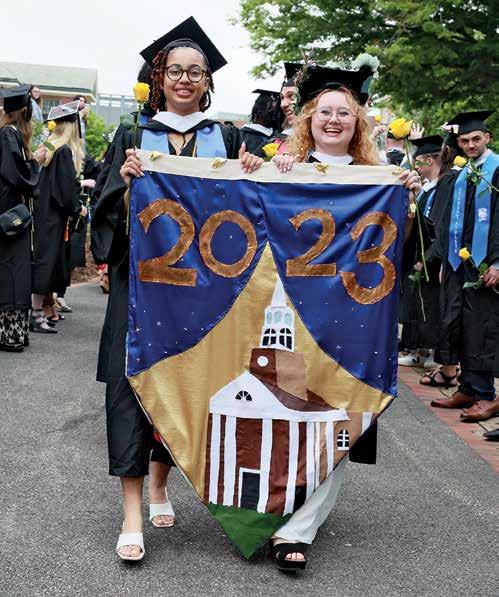
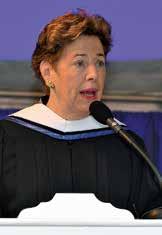
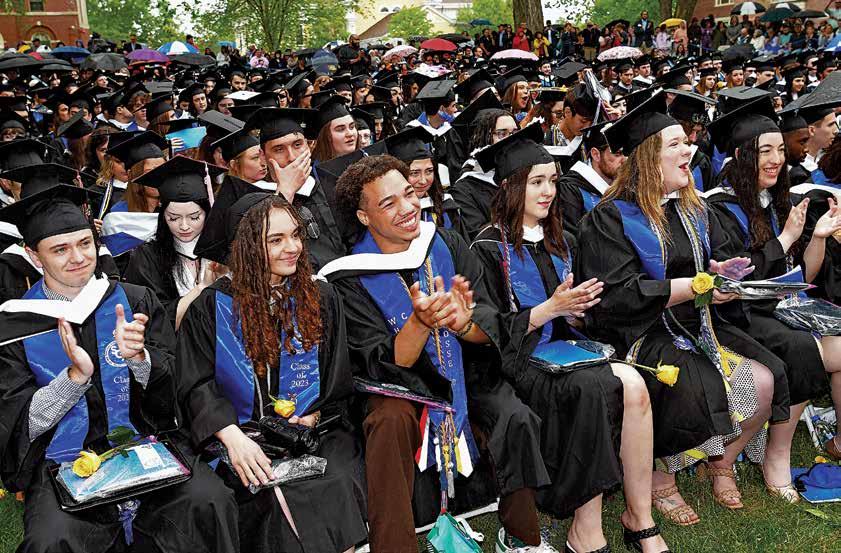
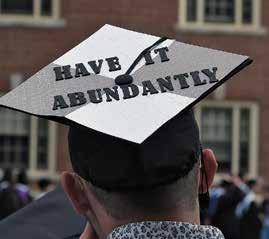
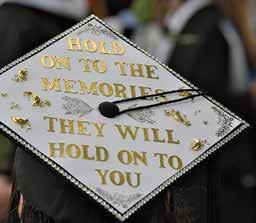
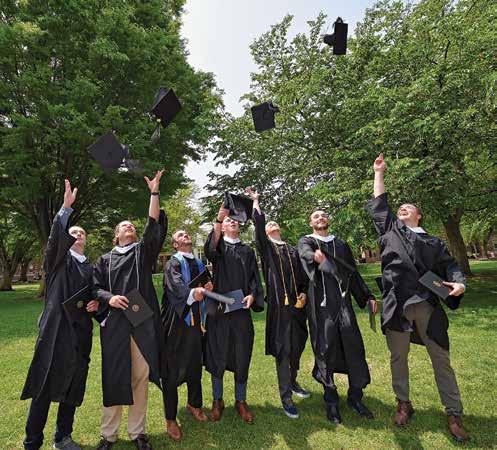
The summer after graduating with a bachelor’s degree in art from Wheaton, Ellen Murphy Warner ’69 set out on a life-changing road trip. In what she described as a “Thelma & Louise”-like experience, she and a friend packed their bags and drove from New York to Mexico City, and then up the West Coast and back across the country. They logged more than 15,000 miles.
The beautiful scenery, and Warner’s keen eye for composition that she developed through the study of art, inspired her to take photos throughout that trip.
It was just the beginning of a longer journey: a career as a photojournalist.
After attending Germain School of Photography, she landed work with the U.S. Department of the Interior. Supervised by Tom Orr, then photo editor of Newsweek , she and three other photographers took photos all over New York City (some by helicopter) for an exhibit at the Statue of Liberty.
Her photos were shown for many years at the national historic landmark until its restoration in the 1980s.
In the years after graduation, Warner also traveled widely, taking photos in China, Iran, East Africa, India and Europe. She felt especially drawn to Indigenous people.
“I like to record ways of life that are rapidly disappearing, and in the process explore the visual relationship of customs and ethnic dress to nature and to the history of the culture,” she said.
Her work has been published in numerous newspapers and magazines. After taking a 10-year break to focus on raising her children, she concentrated on portraits, particularly photos of authors. Later she started traveling around the world and paired her photos with travel articles in The New York Times, Travel + Leisure and The Traveller
About 15 years ago, Warner photographed a French woman who had just turned 70. Her own curiosity compelled her to ask some questions.
“I asked her, ‘What does it feel like to be 70? What did you learn when you were younger that prepared you for this stage of life? How do you look to the future?’ I wanted to know what it's like,” Warner said.
That experience made her decide to approach other women with these questions. For more than a decade, she compiled the answers. Now, they are part of her new book: The Second Half: Forty Women Reveal Life After Fifty (Brandeis University Press, 2022).
The book comprises portraits of each woman and an interview, in her own words, about her life journey and what “the second half” means to her.

Included in Warner’s book are women of different socio-economic backgrounds and different religions. Some are mothers, others never gave birth; some succeeded in their fields, whether as an artist, farmer or healer, others did not. Some are famous, others never had the luxury or inclination to choose a career.
Despite these outward differences, Warner celebrates what connects these women. Many expressed similar values: importance of family and relationships; working hard and doing your best; letting go and knowing yourself; and finding a creative outlet
or purpose.
“It’s very humbling to meet people, whether it’s in North Vietnam, tribal groups, etc., and to see people in their environment and try to understand
their lives. People really are the same everywhere,” Warner said.
Next page: Read a sampling of advice and see photos from Warner’s book
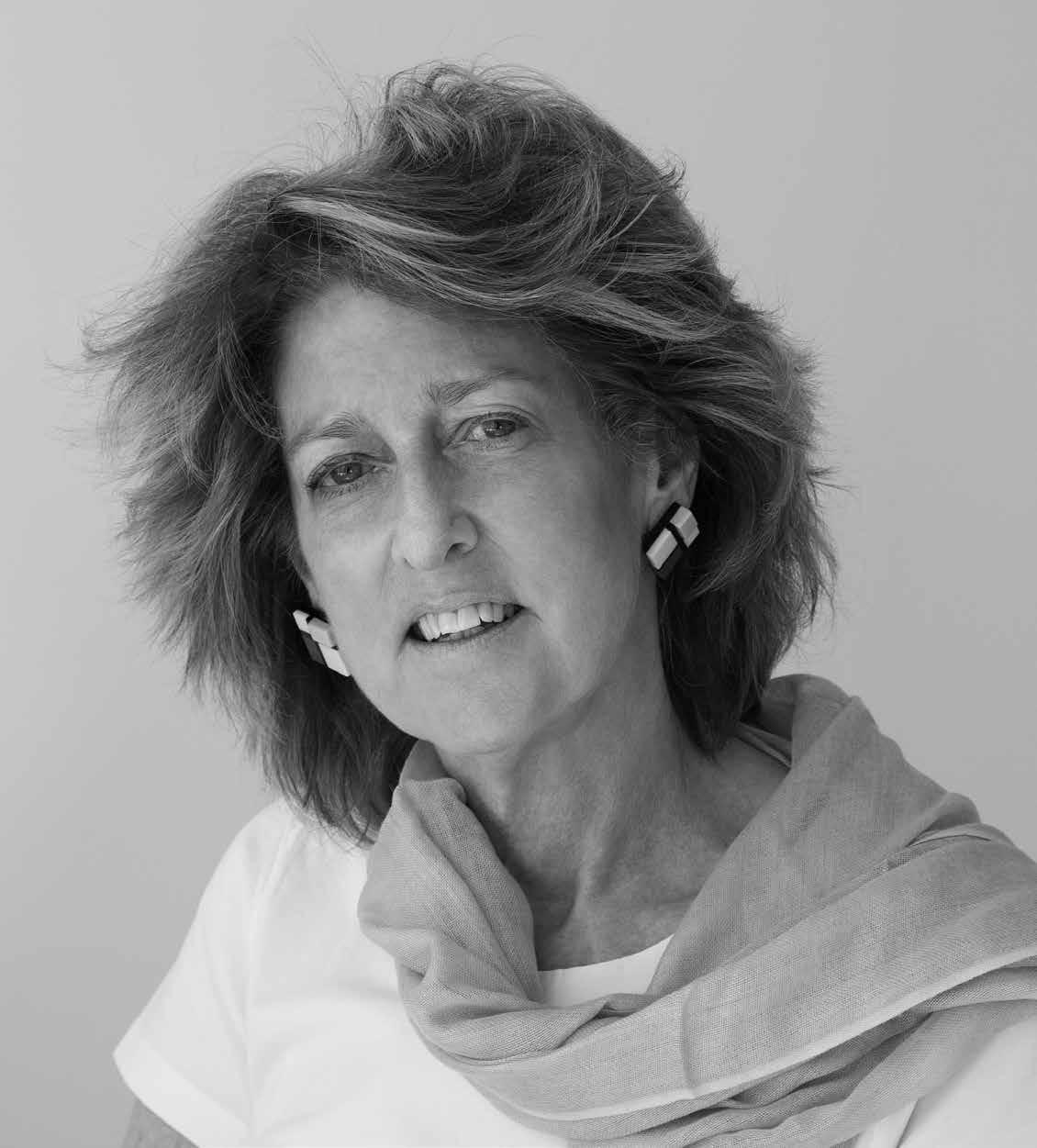
Leslie Caron, actress, interviewed at age 77, Paris, France
“I would advise younger women to have an important focus of interest. So, creation, creation, creation—the world demands people to be creative. There’s always something you can do that will be useful for society, and that’s the secret—to be useful.”
Marilynn Preston, journalist, playwright and TV producer, interviewed at age 60, Santa Fe, New Mexico
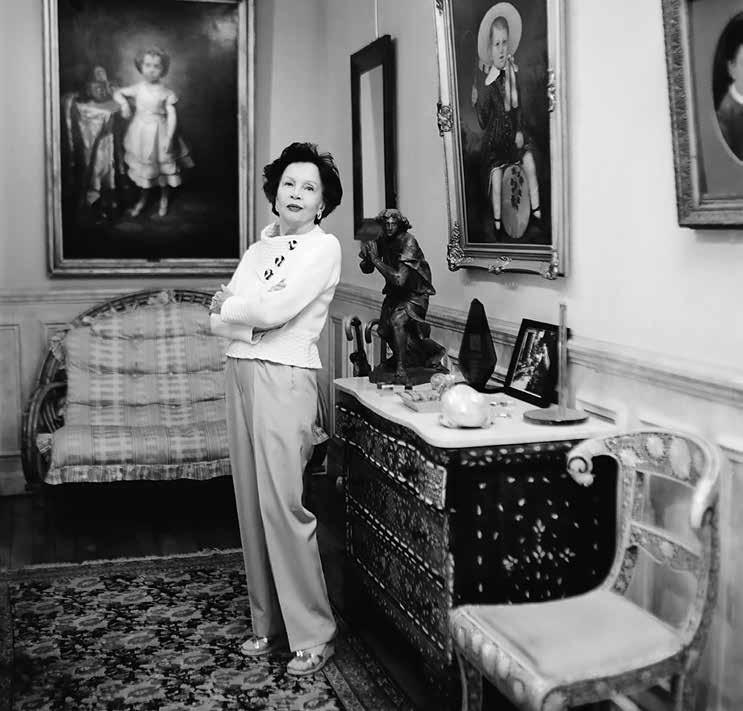
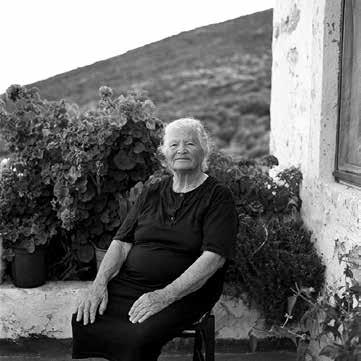
“As you get older, you realize there is limited time left and certain compromises you’ve made just don’t seem good enough anymore. In the second half I’ve learned the power of forgiveness. I needed to forgive myself for the pain I’d caused. I don’t feel like anyone’s victim, and I take responsibility for every choice I’ve made. I feel enormously grateful and energized about the unfolding life in the future.”
Fatma Doufen, Tuareg nomad, interviewed at age 62, Algeria

“You must live in the present moment. It’s important to have guests because an empty house is not a good thing. Never make problems with others.
“If your neighbor says, ‘My sheep have gone away,’ go with her to look for them. If she has guests and doesn’t have a carpet, give her yours. If she has a baby, cook for her. Never say no, and always help others.”
Ni Ketut Takil, sacred healer, interviewed at age 75, Bali, Indonesia
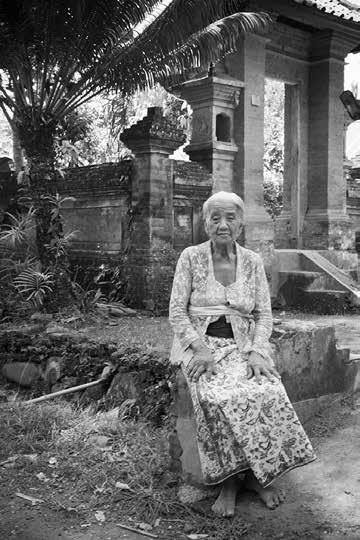
“My advice to younger women would be that you must be on good terms with your family and neighbors. If you have more than they have, give them what they need. And don’t talk badly of other people— don’t gossip.”
“My advice would be only two words: Good words. Speak well of people. Be kind and love them.”
share their advice to younger women navigating their lives and the future:Georgia Nikitara, farmer, interviewed at age 74, Patmos, Greece Ni Ketut Takil Georgia Nikitara Leslie Caron Fatma Doufen PHOTOS BY ELLEN WARNER
Lali Al Balushi, housewife, interviewed at age 60, Muscat, Oman
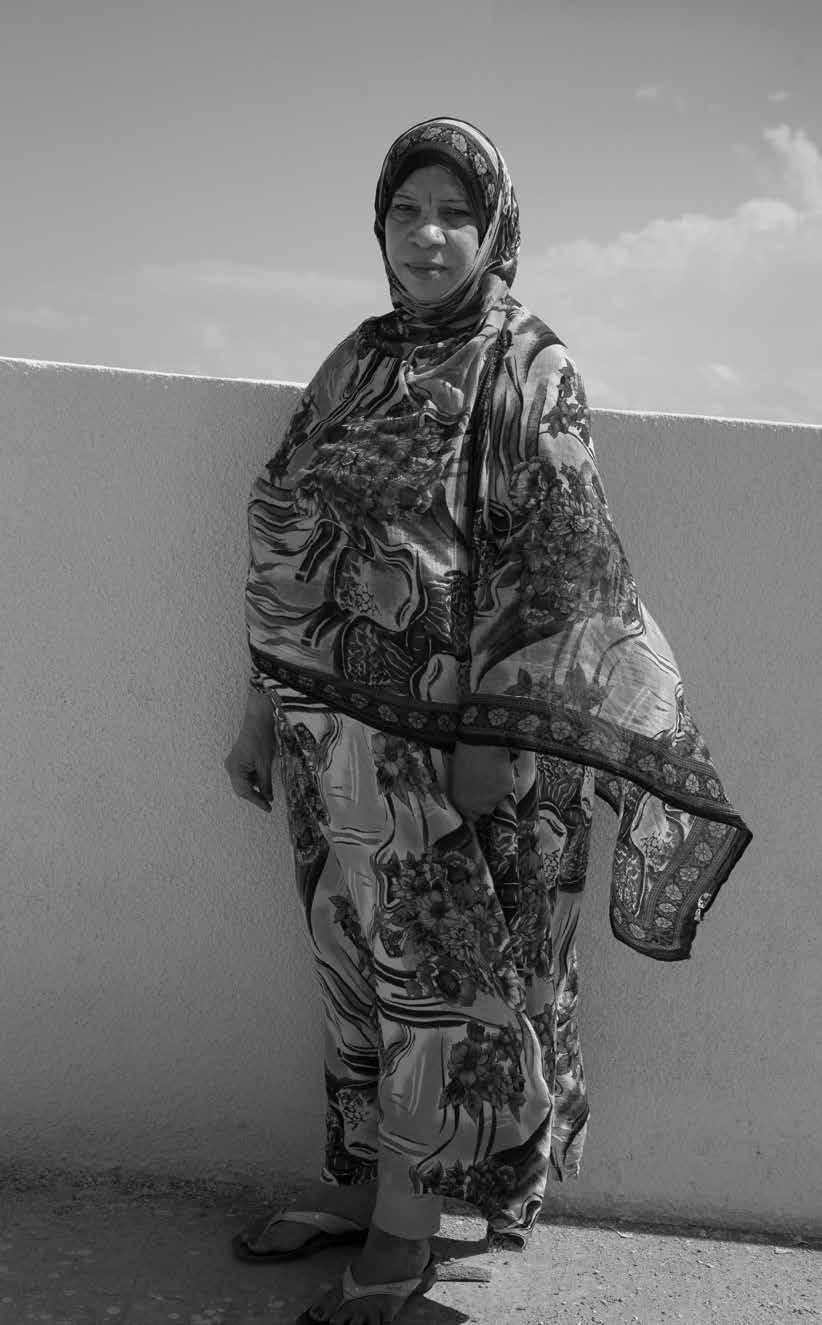
“My advice to young girls would be: When you marry, be careful. … Care about your home, your children and especially your husband.”
Marina Ma, mother, interviewed at age 85, New York
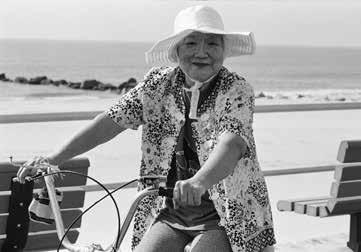
“Most important is to focus on happiness. Don’t think angry thoughts [that] bother the mind. That causes you to collapse, and you don’t want to eat or do anything. Always think on the positive side.”
Ellen Murphy Warner, age 75
“My advice is don’t underestimate yourself. If you have a passion, go for it. I never thought I would be a photojournalist traveling around the world, often on my own. If you have something that interests you, follow it. You can do it.”
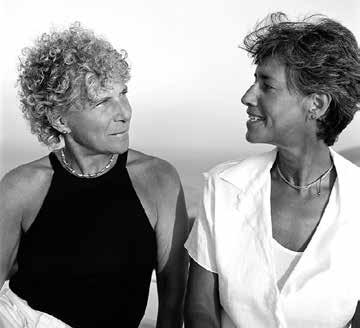
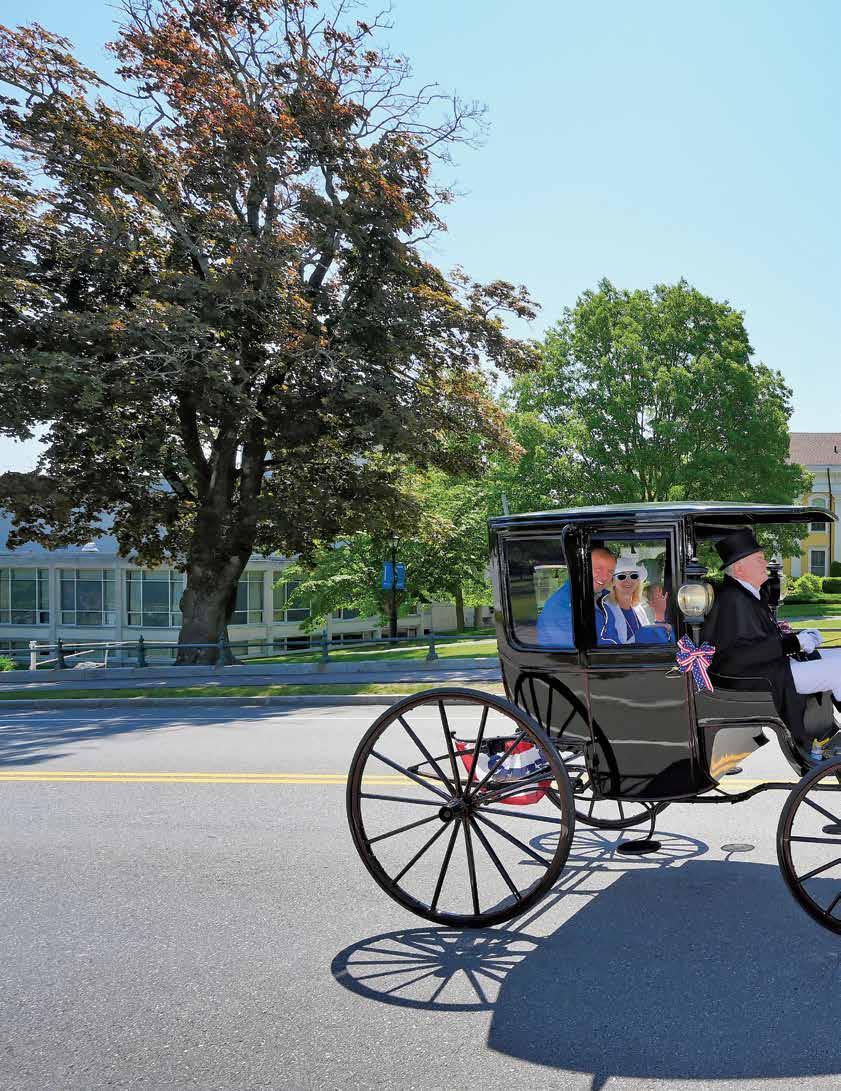 By Sandy Coleman
By Sandy Coleman
In the 1800s, Eliza Baylies Wheaton regularly traveled the streets of Norton in her horse-drawn carriage for errands, visits and meetings, according to her diaries. Today, her restored carriage is a timeless reminder of her vision for Wheaton College as well as her passion for philanthropy and giving back to students, faculty, staff and the local community. The carriage also represents the enduring spirit of philanthropy that
Wheaton President Michaele Whelan and former President Dennis Hanno rode in Eliza’s carriage in the 2023 Norton Memorial Day parade and to the Norton Historical Society, where it is housed and on long-term exhibition. The carriage was pulled by King, a white Percheron draft horse from Remembrance Hill Carriages LLC in Rehoboth, Mass., and driven by John Frost, with help from his wife, Sue.
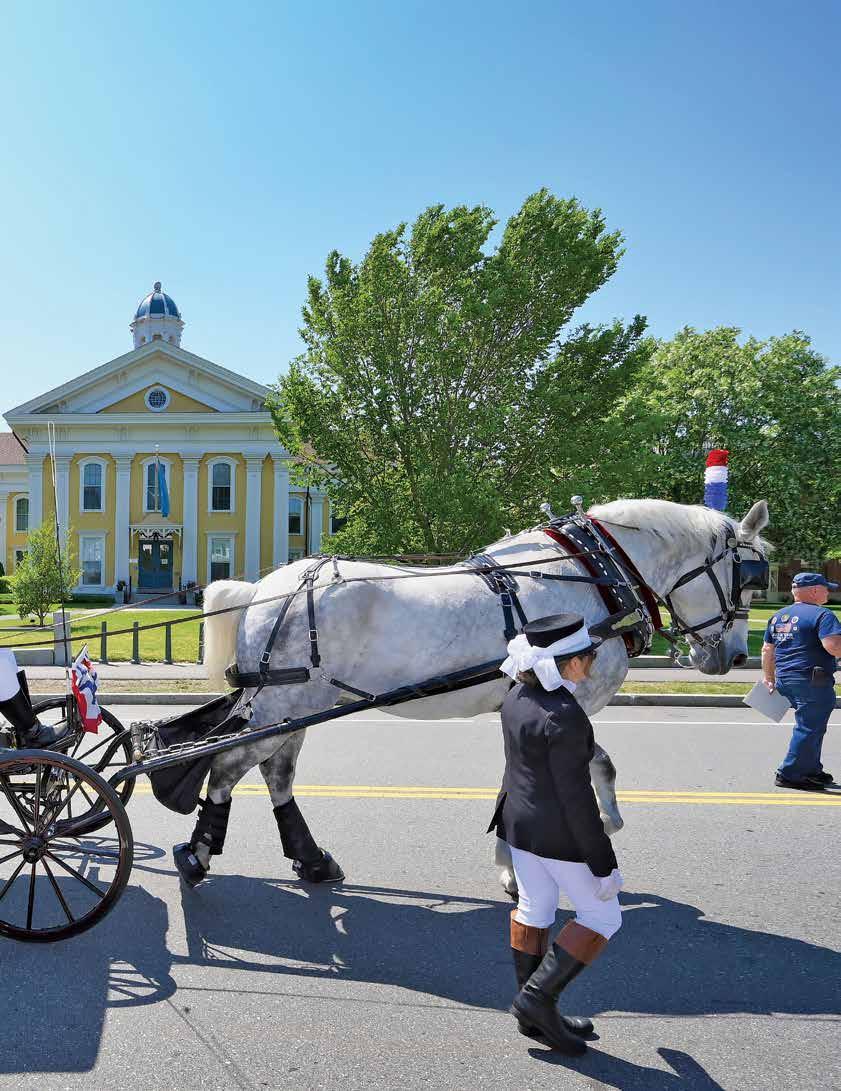
college leaders have carried forward since the inception of the college. To name a few examples:
» Dale Rogers Marshall, Wheaton’s late sixth president, was a member of the Founders Society; was a lead donor who contributed to the college for 27 years; and established an endowed fund, the Adele and William Rogers Fund for Global Education, for faculty support, named in honor of her mother.
» Ronald A. Crutcher, Wheaton’s seventh president, and his esteemed spouse, Betty, have made leadership level contributions to the college for years to support Wheaton students annually through an endowed scholarship in their name, and are members of the Founders Society.
» Dennis Hanno, Wheaton’s eighth president, and his esteemed wife, Sue, are leadership donors and have given to scholarships and the Wheaton College Critical Retention Fund. Hanno also initiated the restoration of the carriage as a labor of love for the institution’s
founder and her belief in the power of education to transform lives and he oversaw the completion of the project before he stepped down from his role.
» Michaele Whelan, Wheaton’s ninth president, and members of the President’s Council recently made a major contribution to the Ronald A. and Betty Neal Crutcher Endowed Scholarship. The scholarship originally was established by the Board of Trustees in 2013 in honor of the Crutchers and to raise additional scholarship funds for the Go Beyond Campaign.
“The carriage encapsulates Eliza’s dedication and focused work throughout her life to create a liberal education for women with opportunities for an abundant life,” Whelan said. “That spirit of giving lives today in our community of students, staff, faculty and alumni, and connects us still to the local community.”
Now Eliza’s restored carriage has a place of honor for all to see. It is housed and on long-term exhibition at the nearby Norton Historical Society, thanks to a collaboration among Whelan, Hanno, the historical society, and former Norton Board of Selectman Bob Kimball and his wife, Paula, who were among many key Norton partners in the restoration efforts.
Hanno initiated the restoration of the carriage in 2019. Kimball and his wife, Paula, and his brother, Bill, drove the carriage in a U-Haul to Pennsylvania to leave it there with Amish craftsman Paul Stoltzfus for a total rejuvenation. In July 2021, Hanno flew to Pennsylvania and rented a 28-foot U-Haul to drive the carriage back to Wheaton.
The sparkling-like-new carriage has been in the barn at the Presidents’ House since the restoration—until it was brought out for a horse-drawn ride in the Norton Memorial Day parade on May 29, 2023. Hanno and Whelan rode in the carriage during the parade and Kimball carried a banner announcing Eliza’s carriage. After the parade, a police escort led the buggy to its new exhibition home at the historical society, located at 18 W. Main St.
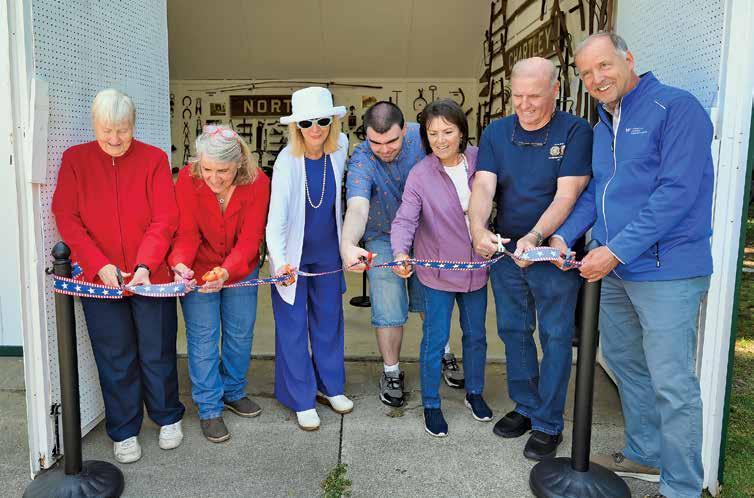
Kimball, a historical society director, made arrangements for special housing to be built to safely store the carriage and to create a space for educational purposes. The historical society restored a shed to house Eliza’s carriage. Artifacts also were curated to create a Norton History Museum that includes the carriage shed.
“Since Memorial Day we have had many visitors stopping by to see our new museum and Mrs. Wheaton's carriage,” Kimball said. “Everyone is very excited to see the history of the town and Wheaton.”
Kimball added that he is continuing to collaborate with Wheaton regarding bringing groups to see the carriage and creating opportunities for the carriage to be available for special events—including for alumni weddings on campus.
President Whelan said Wheaton equally values the partnership and is thrilled that this iconic symbol can continue to gain attention.
“Preservation is part of Wheaton's DNA; we have archives for books and art, and we understand how the past informs the present and shapes the future. So,
The society’s goal is to educate the citizens of Norton by providing an understanding of past traditions and a comprehensive history of the town. The carriage is on display in a restored shed at the Old School House at 18 W. Main St.
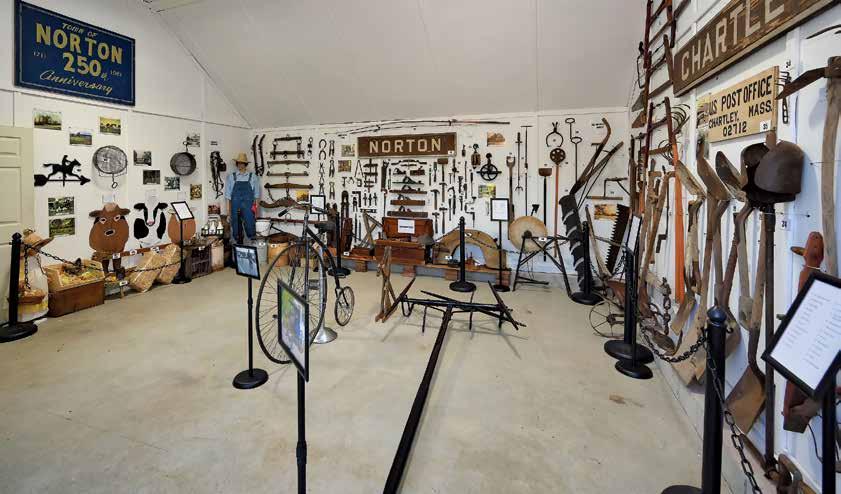
Read more online at nortonhistoricalsociety.org
sharing the carriage is in keeping with our educational mission. And, Wheaton’s and Norton’s histories are deeply intertwined,” Whelan said.
“What is most exciting is that the historical society is open to the community and to the schools, so everyone will have an opportunity to see the carriage in some historical context in the new space that the society created,” she said.
Hanno is particularly happy to see the carriage in a place of prominence so close to campus. Prior to the restoration project, the buggy was at a museum in Middleboro, Mass.
“Wheaton is a central part of Norton's history, and the town of
Norton is an important partner for the college,” said Hanno, who now is a clinical associate professor at Fordham University in New York. “I'm certain that Mrs. Wheaton's beautiful carriage was well-known around town, and it belongs nowhere other than right here in town. It is so exciting to see it at the museum near campus, where both town residents and members of the Wheaton community can view it and learn more about the shared history of the town and college.”
“Wheaton College has an incredible history, one that everyone connected to the college should point to with pride. There are many campus traditions and spaces that help us honor that history, and the restored carriage is one more very visible way to remind us of how we got to where we are today. History is important, and preserving the carriage and sharing it with others impacted by Mrs. Wheaton—the town—is so consistent with Wheaton’s values,” Hanno said. “The carriage has been and hopefully will continue to be a very visible representation of how the college and town can work together.”
Professors like myself at liberal arts colleges like Wheaton are passionate and accomplished teachers who love working with students. We are also scholars and artists who produce knowledge and create art, and this research and creative work is central to our careers, the education we provide and the excellence of our institutions.
During the academic year, teaching and myriad other time-sensitive obligations fill our days, nights, even weekends. As we write lectures, prepare classes and labs, grade assignments, hold office hours, serve on college committees and more, finding time and space to work on our scholarship proves incredibly difficult—a challenge that all higher education faculty face.
Here at Wheaton, we have created one solution. Write Now, Right Now (WNRN), a faculty-led initiative begun in fall 2016, supports us in our research and creative work. Moreover, through

WNRN
Write Now, Right Now
A faculty-led initiative that began in the fall of 2016 to support faculty research and creative work.
Located in the Diana Davis Spencer Discovery Center Dedicated to Free Speech and Innovation.
WNRN, our faculty visibly model for students and the broader college community how one creates knowledge and art, day in and day out, amid all of life’s other obligations and expectations, meetings and to-do lists, while simultaneously strengthening the college and our community.
WNRN is most fundamentally a space: Room 1347 in the Diana Davis Spencer Discovery Center Dedicated to Free Speech and Innovation. There are tables and chairs, soft lighting, docking stations with large monitors, a professional development library, coffee, tea and snacks. Faculty host hours every weekday during the semester and most days during the summer, and invite colleagues to work alongside them what we call co-writing.
WNRN is the hub for a variety of faculty research and creative work. Above, Aubrey Westfall, associate professor of political science, and Dana M. Polanichka, professor of history
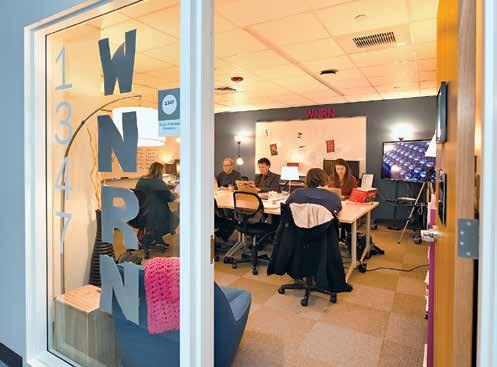

(Picture a coffee shop filled with people hard at work on their laptops.)
The space itself is key. “Every writer knows the importance of place,” said Tom Dolack, senior professor of the practice in Russian studies. “WNRN is a dedicated place where our brains can automatically shift to writing mode and block out the things that otherwise distract us.”
Dolack hosts many sessions in the writing room. He recently has been editing a volume called Cognitive Approaches to Russian Literature scheduled to be published by Lexington Press next year.
Katherine Mason, associate professor of sociology, wrote and revised her recently published book The Reproduction of
Inequality: How Class Shapes the Pregnant Body and Infant Health (New York University Press, 2023) in WNRN. She already has plans to begin drafting her next book in co-writing sessions.
“WNRN has contributed incredibly to my sense of community, intellectual and otherwise, at Wheaton,” Mason said. “I've participated in different ways—attending in person during the semester, serving as a virtual meeting host when we were remote, and joining a group of WNRN participants for a writing retreat off campus. These activities have helped me stay connected to my writing, even when the demands of teaching made that challenging.”
The space also has contributed to greater joy and satisfaction in their work, participants noted.
“I have struggled for a long time at the boundary where the joy of performing research collides with the dread of writing it up for publication,” said Geoffrey Collins, professor of geology and an investigator on NASA’s Europa Clipper mission. “The gentle social pressure of WNRN has helped me to stop procrastinating and push forward on my writing tasks, so that more of the projects my students and I have done will see the light of day.”
WNRN aims to be not only supportive, but also inspiring.
Faculty list their current projects and stages of progress on a whiteboard. At
any given time, one can see a growing list of a dozen-plus articles, grant applications, book manuscripts and conference papers in development on topics ranging from praying mantises to Muslim civic engagement, from juvenile adjudicative competence to medievalism in John Steinbeck’s writing.
Aubrey Westfall, associate professor of political science, said “the whiteboard helps me recognize my colleagues’ work, and demonstrates the breadth of knowledge generation happening on our campus. It makes me feel proud to be part of a vibrant scholarly community.”
Westfall, who works on the policies and sociopolitical practices regulating the political behavior of minoritized groups within Western democratic societies, wrote The Politics of Immigration in Scotland (Edinburgh University Press, 2022), as well as many articles, conference papers and a co-authored book in WNRN.
WNRN’s effect on productivity and output among participating colleagues has been tremendous. My own (Dana M. Polanichka) productivity has at least tripled. Since founding WNRN, I have published six essays on gender, space and Christian devotion in the early medieval empire of Charlemagne; co-edited a volume on medieval cultural identity and power; and drafted two book manuscripts on early medieval women, to name a few.
Also, Westfall and I have used the room to collaboratively co-author three articles about this space and its programming
that have been published in The Chronicle of Higher Education and Inside Higher Ed.
Linda Eisenmann, professor of education, used the space to write a literature review on the history of women and gender in higher education. It was published in 2023 in the Higher Education Handbook of Theory and Research.
Miranda Yaver, assistant professor of political science, has been working on her book manuscript Coverage Denied: The Scope and Impact of Denied Medical Coverage in the United States (under contract at Harvard University Press) in WNRN since joining Wheaton in fall 2022.
John Partridge, professor of philosophy, most recently has been using the room to work on an article on the role that happiness plays in a meaningful life.
“The chance to do regular writing in a supportive group made a huge difference to my ability to sustain productivity during the busier parts of the semester,” said Partridge, noting that it also has kept his research life in the foreground.
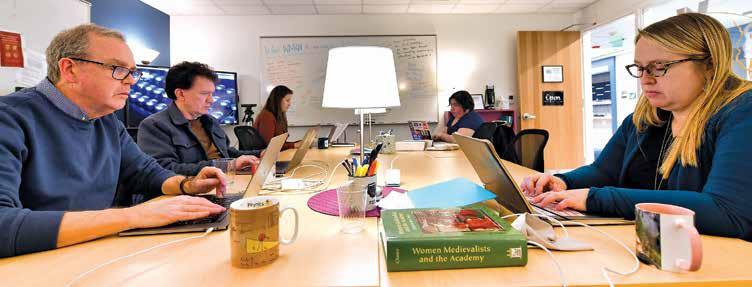
Jonathan Brumberg-Kraus, professor of religion, expressed similar sentiments: “Pretty much everything I’ve written, published, presented or proposed since its inception [a book, numerous articles, conference presentations, a Fulbright and other grant applications, and at least three new book proposals] has benefited from the time and space I spent in our WNRN writing room and with my writing group.”
His book Gastronomic Judaism as
Culinary Midrash (Lexington, 2020) is a notable example on that long list.
Chapter one
WNRN is a grass-roots effort that drew its initial inspiration from the international co-writing community called “Shut Up & Write!” I (Dana) first heard about co-writing in spring 2016 when I was struggling with my own research productivity, seeking better writing habits and yearning for a more communal intellectual life.
I decided to reach out to Wheaton colleagues and friends for their advice. Their responses demonstrated a widespread need among faculty for research support and resulted in many great ideas, including co-writing, upon which I seized.
In fall 2016, I found open hours in my schedule, booked rooms, shared colorful flyers to invite colleagues and rolled in a makeshift coffee cart multiple days per week. A few faculty members became co-writing stalwarts, and by January 2017, the college offered its support in the form of space and funding. Meanwhile, I formed a dynamic collaboration with Westfall that has sustained and strengthened WNRN, particularly during our varied sabbaticals and semesters abroad.
While many research universities host faculty professional development centers,
very few small liberal arts colleges do, and no schools that we know of host regular co-writing sessions. WNRN fills that gap and helps us collaborate with colleagues at research universities.
“Most of my science collaborators work at research institutions and don’t always appreciate the many roles we have to play as faculty at a liberal arts college,” said Collins. “It is all too easy during the semester to put off my research in the face of all the other tight deadlines and competing demands for my time. … With WNRN, I found that I could more effectively keep up with my research collaborators even during a busy teaching semester.”
The ability to collaborate makes WNRN a vibrant, inclusive community where faculty connect, share advice and ideas, and mentor one another. It draws professors out of labs and offices during breaks and serves as an open invitation to interact with each other across departments and disciplines, and as a welcoming space for new faculty.
“The community of graduate school is often lost when you become a new faculty member,” said Sabrina Speights, assistant professor of business and management, who began using the room soon after joining Wheaton in 2018 to pursue her
research on work-life interface and managing emotions in work-family conflict. “WNRN has been great because it offers a community that encourages research that I can simply drop into that is already established.”
Fatima Jebari, assistant professor of business and management, who began working at Wheaton in 2020, added: “As a junior faculty member new to Wheaton, WNRN has been a space where I could meet other colleagues and write.”
Jebari studies the impact of political activism and social responsibility on the decisions made by corporations.
One of the most artful descriptions of WNRN and its effect on faculty scholarship has come from Matthew Gingo, associate professor of psychology: “I love celebrating everyone's publications, but I know that if you want a tree to grow, you water the roots, not the leaves. If there is an intellectual incubator on campus, a greenhouse where our scholarly endeavors take root and are nurtured, WNRN is it.”
It is a description that also speaks to the nourishing environment that has led to the start of many other programs from the roots planted in WNRN. Those include writing retreats; the formation of faculty writing groups; Faculty Flash Talks that allow the sharing of the research with colleagues in an informal setting; and an annual Faculty Success Summit that offers workshops on grants and fellowships, publishing, studentfaculty research collaboration, technology and more.
The lessons learned from WNRN also positively have affected senior seminars in history and political science, with students working on their own original research papers in a designated student co-writing space in Knapton Hall. Laura Bohn Case, senior professor of the practice of German, has introduced the idea of co-writing to her translation course. And I also have introduced the concept to my new writing course.
For faculty, staff and students, WNRN has turned the solitary act of writing into an act of solidarity and community.

More than 300 alumni returned to campus for Reunion Weekend May 19 through 21 to reconnect with one another and celebrate the graduating Class of 2023. They came from 23 states, including Alaska, and traveled from as far away as England, Estonia and El Salvador.
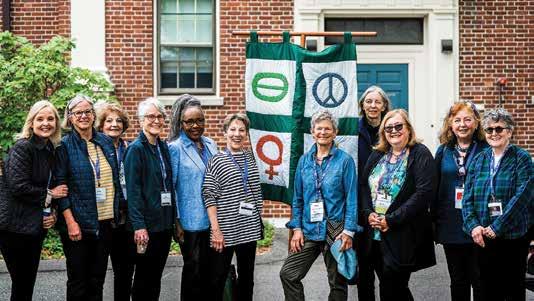
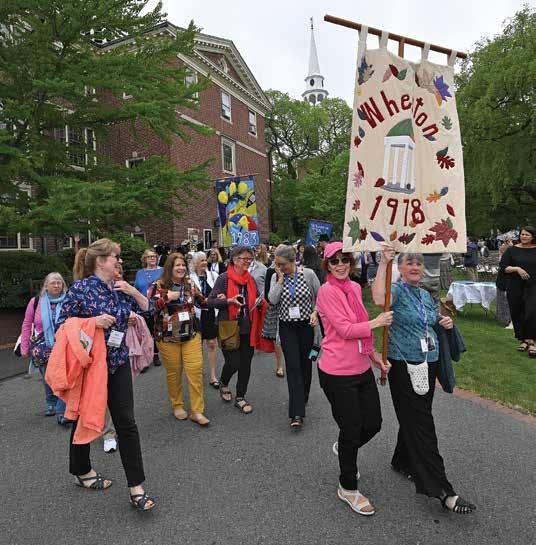
Alumni participated in the traditional procession on the Dimple preceding Commencement and enjoyed a busy schedule of activities, including a tour of the new nursing program suite, the Athletics Yowell Hall of Fame induction ceremony and the Annual Meeting of the Alumni—which featured the presentation of the Alumni Achievement Awards to Judith Garcia ’13, Mal Malme ’88, Zachary Agush ’12 and Jane Rowe Mraz ’57. And, of course, there was the Reunion dance.
In her remarks at Commencement, President Michaele Whelan extended special greetings to the Class of 1973 celebrating their 50th Reunion and the Class of 1998 celebrating their 25th.
“We are also joined by the members of the Class of 1968. In celebration of their 55th Reunion, classmates worked together to establish an innovation fund to support the college’s efforts to grow and change for the benefit of future classes. It is a very forwardlooking and generous gift, and I am inspired, encouraged and grateful for their efforts,” Whelan said.
“And I would be remiss not to call out the Class of 1958, who are celebrating their 65th Reunion. We are honored to welcome you all, including Life Trustee Adrienne Bevis Mars whose devotion to Wheaton is without peer. Her record of service to the college as an alumna volunteer and trustee spans six decades; her generosity and that of her family have transformed the college and the lives of thousands of Wheaton students,” Whelan said.
—Laura Pedulli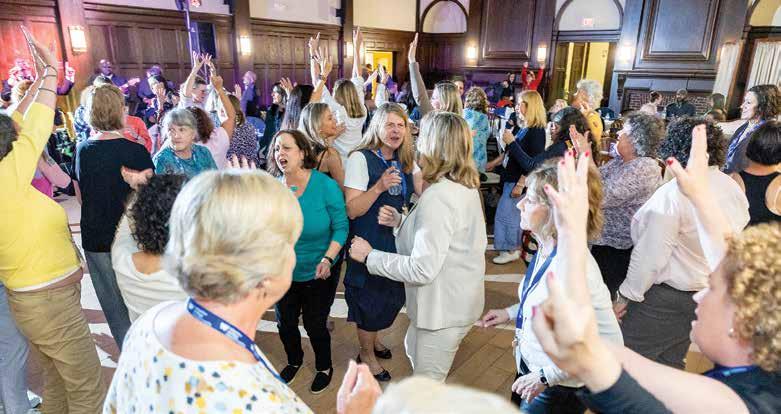
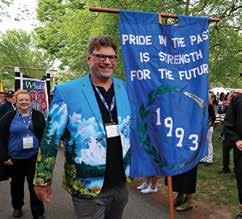

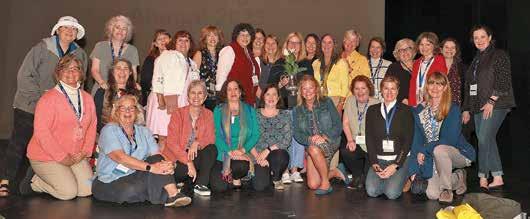
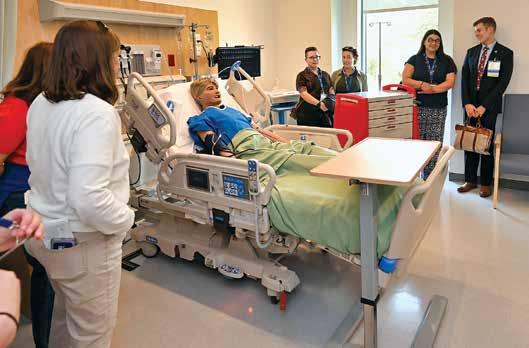
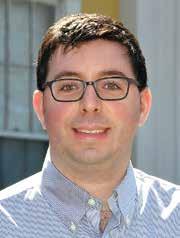
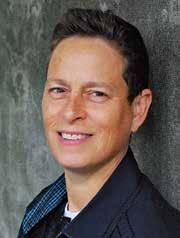
During Commencement Reunion Weekend, Wheaton presented four individuals with Alumni Achievement Awards in honor of their extraordinary contributions to society and the college.
Garcia, a rising star in politics, was recognized for her work as the state representative for the 11th Suffolk District in Massachusetts, city councilor for Chelsea and communications manager for the nonprofit Neighborhood Developers. She also served on an advisory committee to Vice President Kamala Harris regarding Honduras.
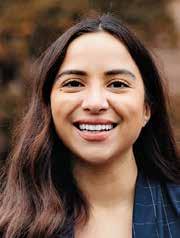
“Judith’s tireless commitment to the Latinx community immediately stood out. Her empathy for working-class immigrants has translated into a real impact on the lives of those in Chelsea during her time as a member of the City Council, resulting in initiatives to increase affordable housing, access to education, and economic development,” said Caitlin Grant ’09, Wheaton Alumni Board of Directors member-at-large and chair of the Awards and Recognition Committee.
Malme was recognized for their work as a Boston-based theater artist with a background in LGBTQ+ activism and advocacy, and for bringing countless smiles to children as a professional health care clown with the Laughter League at Boston Children’s and Hasbro Children’s hospitals for more than 25 years.
“Mal’s unique career as a ‘professional clown, actor, activist, writer and harbinger of goodwill’ as their nominator explained, immediately caught the attention of the board, and as we dug deeper, it became clear that Mal’s selfless dedication to spreading love and laughter, helping those in a time of hardship or struggle, is truly inspiring,” Grant said.
Agush, principal planner for capital development at the Rhode Island Public Transit Authority, won the Heather J. Corbett ’86 Fostering Wheaton Community Award for community building at Wheaton. He has served in roles that include being a class council member, gift chair and Filene Center for Academic Advising and Career Services volunteer. He also was actively involved with the Greater Boston Young Alumni Club Board.
“His nearly decade of work as a Class of 2012 gift chair and his work to ensure his class achieves its goals demonstrates his time investment, commitment and belief that a Wheaton education and experience can positively impact the future,” Grant said.
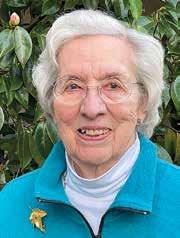
Mraz received the Sharon M. Howard ’87, P’09 Outstanding Wheaton Service Award for making a significant and sustained contribution or service to Wheaton. Mraz—a former account manager for the McKesson Corp.—has served on the President’s Commission for 10 years; the Alumni Board of Directors for five years; the Alumni Giving Committee for eight years; and as a phonathon caller for 11 years. Mraz is a constant presence at West Coast alumni events and also supports educational excellence through an endowed scholarship in her name.
“It’s one thing to be a member of a committee, but it’s another one entirely to be an active and dedicated participant. It’s clear that she has brought an important and impactful perspective over the years that has undoubtedly influenced Wheaton’s trajectory for the better,” Grant said.
—Laura Pedulli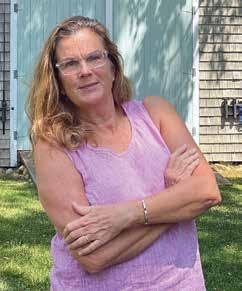
For Deborah Williams ’86, young adult fiction is a powerful way to take the pulse on current cultural trends—and the challenges we face as a society. The alumna recently made the case for the importance of young adult fiction in her book The Necessity of Young Adult Fiction (Oxford University Press, 2023). The publication has received high marks from Kirkus Reviews and the School Library Journal. Michael Cart in Booklist described the book as “an intellectually stimulating examination of young adult literature.” Williams, who majored in English and creative writing at Wheaton, credits the late Professor of English Beverly Clark for helping inspire her passion for literature and her successful career as a New York University (NYU) professor. In an interview, she shares more about her work, the influence of her Wheaton education and her scholarship at NYU.

“The book starts with an anecdote about a colleague who was dismissive of ‘kid’s lit,’ even though it’s an increasingly important field within literary scholarship, and I think one impetus for my book was in response to his disdain—not that he would notice. More seriously, I’d just written a long chapter about U.S. children’s
literature for a big literary history project, The Oxford History of the Novel in English, Volume 8: American Fiction Since 1940, and there was a lot more I wanted to say that didn’t fit into that essay. Like many writing projects, this book emerged from a question: what does young adult fiction show us about the problems of our cultural moment? I kept seeing the same themes emerge in wildly different types of books and I wanted to explain why these themes were important, even to people who think that reading young adult fiction is somehow ‘not serious.’ The genre explores ideas about community and inclusion, about the importance of reckoning with the climate crisis, about doing away with xenophobia and nationalism—and about the importance of becoming good readers.”
Why is contemporary young adult fiction so important to youth today?
“I think that it’s really important for young people to be able to read widely, which is why the book bannings happening all over the country are so frightening: reading is how we broaden our understanding of lives different from our own,
how we learn to ask questions about the world around us. This is precisely what book banning wants to prevent: no questions, no challenges, no new ideas.”
What impact did the late Professor Clark have on your work and career?
“When I was a student at Wheaton, Bev’s class was one of the first encounters I had with the idea that the books I loved growing up could be ‘serious’ subjects of study. And pretty much everyone who studies children’s literature owes a debt to her book Kiddie Lit: The Cultural Construction of Children’s Literature in America, which truly revolutionized the entire field.”
What courses and areas of research are you involved in as a clinical professor of liberal studies at NYU?
“In addition to my academic writing, I write non-academic essays and fiction. At the moment, I am teaching essay courses and first-year composition in liberal studies at NYU. I taught at NYU Abu Dhabi [2011–2023], and while I was there, I taught creative nonfiction, as well as courses on children’s literature, monsters and global women writers. One of the writing courses I taught this spring at NYU was called ‘Frankensteins,’ and was all about the ways in which humanity keeps inventing things that elude our control—and at the beginning of that course, ChatGPT was launched, a great illustration of what we were talking about. I’m also working on an academic book right now about global liberal arts education: what’s the point, what does it offer us, where does it fail? And I’m using my scholarly knowledge about U.S. women writers [my first book, Not in Sisterhood, is about female authorship in the early 20th century] to write a novel based on the life of Edith Wharton.”
—Laura PedulliGenerations of Chorale and Chamber Singers performed together during a special event on April 30 at Cole Memorial Chapel. More than 40 attended, including Jill Hirst ’21, Stephanie Burlington Daniels ’97, Jasmine MacDonald ’21, Melissa Kimball Newell ’02, Regina Sekkes Nowselski ’02, Bethany Tetreault ’23, Ophelia McGrail ’23, J.P. Burlington ’99, Joey Del Santo ’25, Chelsea Toole Barbini ’98, Kyra Conover ’24, Libby Morrison ’26, Daniel Wilson ’04, Mosope Bakare ’26, Shana Cobin ’97, Claire Richmond ’23, Zoe Krueger ’24, James Wegener ’18, Bianca Iannitti ’15, Sam Von Ehren ’10, Elizabeth Peterson ’15, Emily Bergmann ’16, Deanna Biddy ’17, Ben Diamond ’04, Allison Tetreault Van Duyne ’14, Alexa MacMullen ’15, Zachary Jackson ’08, Elyse Hendrickson Seltzer ’07, Ian Hamilton ’21, Christopher Nowselski ’01, Emily Conklin ’13, Nellie Boling ’21, Anthony LaRocca ’26, Jordan Trundy ’10, Emily Darling ’21, Ryan Ouellette ’23, Robert Allen ’22, Elizabeth Moore ’22, Miriam Morek ’21, Jenna Denomme ’23, Tony Wortman ’23, Elio Simpson ’24, Mary Hodge ’25, Janna Frelich ’78, Grace Lai ’25 and Hillary Shusterman ’14.
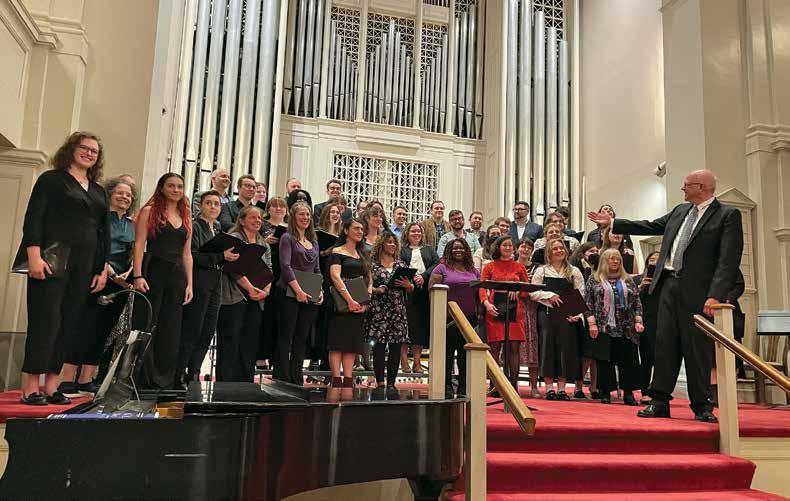
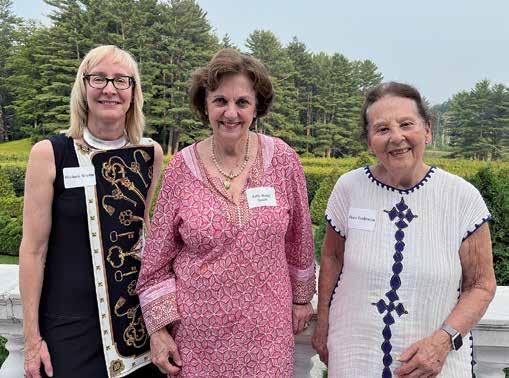
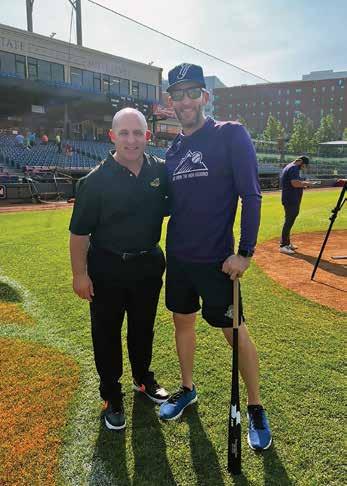
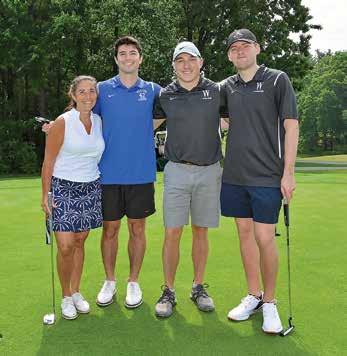
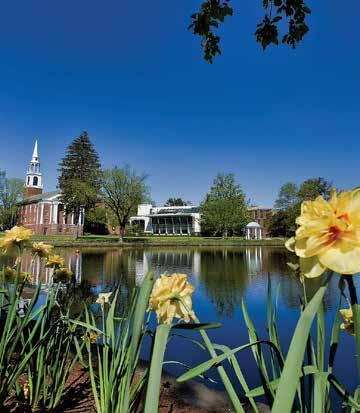
On May 18, the family and friends of the late John Hazen White III, Wheaton Class of 2010, gathered for the dedication of a memorial tree planted in the President’s
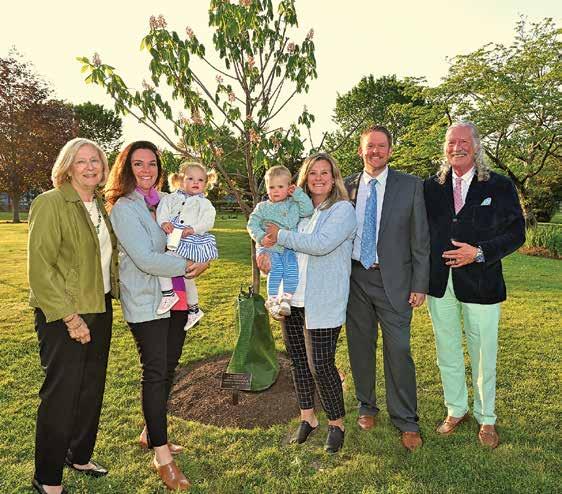
Garden. A hardy chestnut tree was selected.
“John’s chestnut tree commemorates his life at Wheaton College—that important chapter
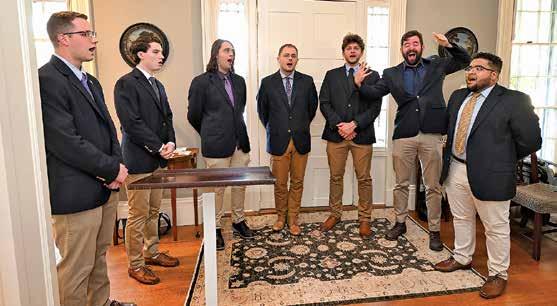
in his growth,” said President Michaele Whelan in her remarks. “As an English major at Wheaton, John explored his passions for creative writing and
literature—and I have been told that he remained an avid reader and writer after his graduation. Wheaton College was fortunate to be a part of John’s story.”
Several members of Wheaton’s Board of Trustees attended the event, and Board Chair Janet Lindholm Lebovitz ’72 noted the very important place that trees hold on Wheaton’s campus. “Trees are a living part of our heritage and stand tall in the memories that alumni, parents and friends share. It’s our hope that John’s tree flourishes and thrives in the President’s Garden for generations to come.”
John’s brother Ben, a member of Wheaton’s Class of 2012 and a trustee, said, “The White family is so thankful to have the opportunity to honor such an amazing young man’s life with the dedication of this tree in his name. Wheaton played an important role in John’s journey, and it is so special that this tree will forever be a place where all who knew him can come back to visit.”
Josh Stenger, professor and chair of Film and New Media Studies, remembered John as a student. They both arrived at Wheaton at the same time. “John was in my first-year writing class, and he was in classes of mine each of his four years here. He was a fantastic person to welcome into any classroom. At his core, he was an amazingly kind, open-book of a human being. He just let people in. It was a pleasure to watch him grow.”
John Hazen White Jr. P’10 ’12, a former Wheaton trustee, described his son as “a direct reflection of his mother’s spirit, soul, passion. Planting a tree for John gives Wheaton a memory of him, gives the White family a place to go back to, and it also leaves a piece of the White family here at Wheaton permanently. It was because of John that the White family became involved with Wheaton, and that shall continue.”
—William WalshReport changes of address and email to Alumni Relations at 508-286-8207 or alum@wheatoncollege.edu.





Contact us at classnotes@ wheatoncollege.edu and we will put you in touch with your class secretary.

Contact our Alumni Relations Office to get involved at 508-286-8207.




By email: Submit Class Notes to classnotes@wheatoncollege.edu. Include your class year in the subject line (e.g., “Class Notes, 2001.”)
Winter: Sept. 26, 2023

Spring: Jan. 16, 2024
Fall: June 4, 2024


To submit digital photos, email them as an attachment to classnotes@wheatoncollege.edu. For full guidelines, visit wheatoncollege.edu/wheaton-magazine/ submitting-digital-images. For all photos: Please supply a brief description of the event and all the names and class years of
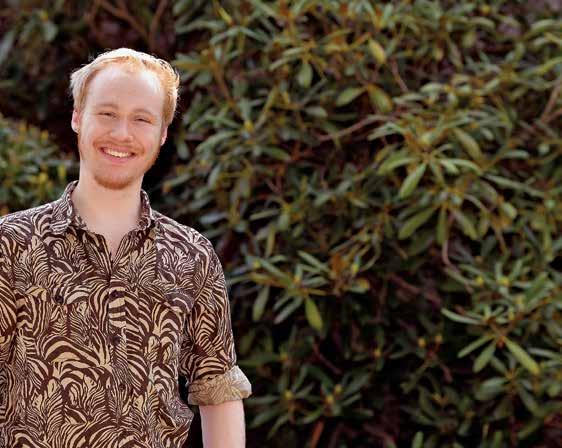
“Wheaton has provided many experiences that will help me achieve my goals. I am extremely grateful for the Department of Theatre and Dance, which graciously allowed my production of “Hamlet” to come to life last semester on campus. In the future, I aspire to work in the theater industry, hopefully directing plays and as an actor. This scholarship means that I will not have an enormous amount of debt after I graduate.”
Give to the Wheaton Fund today to support the dreams of tomorrow.

Go online to learn more about how your support creates opportunities for Sven and other students.
wheatoncollege.edu/giving
the alumni in the picture. Please note: The photos you send in must be sharp and clear. Photos that are out of focus, or that have harsh shadows, overexposed areas or “red-eyed” subjects may not be usable. Often we receive more photos than we can use in any one issue. When this happens, we will select photos that represent a variety of class years and timely events.
Marjorie “Mimi” Hutchings Sanborn , 108, died on April 12 in Durham, N.C. She was married to the late Morton Sanborn. Mimi graduated from Wheaton with a bachelor’s degree in art. After marrying Morton, they lived in Waretown, N.J., and together owned Sanborn's Anchorage. Marjorie moved to North Carolina in 2011 to be closer to her family. She was a prolific artist and world traveler. She was a member of the Pine Shore Art Association. Mimi will be remembered for the many wonderful birthday celebrations and the joy these parties brought her.
Audrey Farrow Priscilla von Bieberstein, 96, of Santa Barbara, Calif., died on May 24. She graduated from Wheaton with a bachelor’s degree in art and was a member of the college’s Glee Club. She was a school administrator with the Goleta Union School District.
Jean Schabacker Donati, 96, a resident of Williamstown, Mass., died on May 5. She was an English major at Wheaton. Jean married Richard Donati in June 1949. The couple and their five children lived in Stockbridge, Mass., and then spent a year in Viareggio, Italy. In 1966, Jean joined Williams College as manager of the Berkshire Symphony. She retired in 1988. Jean was a member of the First Congregational Church. She volunteered for more than 25 years at the North Adams Regional Hospital and was president of the Williamstown Community Chest.
Marion Lanphear Naifeh, 95, died May 20 in Aiken, S.C. She is predeceased by husband George Naifeh. Marion graduated from Wheaton with a bachelor’s degree in Spanish. She spent her junior year abroad in Mexico, which gave her a lifelong love for Mexican culture. She studied Latin American economics at Johns Hopkins. It was there that she met her husband. After completing their studies, they spent nearly 30 years overseas: in Iran, Iraq, Libya, Nigeria, Pakistan, United Arab Emirates and Jordan. Marion impacted lives in many other countries teaching English as a Second Language. She also wrote the books: The Last Missionary in China, Foreign Service and Finding My Mother: The Red Box.
Susan Hall Bamford, 92, died on April 13 in Manchester Center, Vt. She was married to Joseph Bamford. Susan graduated from Wheaton with a bachelor’s degree in English and sang with the Whims. Susan served on the boards of Planned Parenthood in Paterson, N.J., and St. Johnsbury, Vt., and was twice awarded their distinguished service award. Susan also served on the Vestry of St. Bartholomew’s Episcopal Church in Ho-Ho-Kus, N.J., and was a member of the board of trustees of the Fairbanks Museum. She served as a medical missionary with her husband in St. Lucia, Kenya and Uganda. Susan also sang alto in church choirs and choruses all her life.
Nancy Ballantyne, 91, a resident of Peabody, Mass., for seven years, formerly a resident of Reading, Mass., for nearly 40 years, died on Nov. 4, 2022. Nancy majored in sociology at Wheaton and later completed her master’s degree in social work. She began her early career in Connecticut, but spent the bulk of her career working for the Arlington School District as a social worker. She was active in her community, both in Reading and, in more recent years, her community at Brooksby Village. She was an avid reader and participated in the book club at the Reading Public Library.
Thelma “Terry” Latchis Carvelas, 92, died on February 25 in Park City, Utah. Terry majored in French at Wheaton. In September 1952, she married James Carvelas and in 1960 they moved to Rye, N.Y., where they lived for 34 years before moving to Park City, Utah, in 1994. Terry devoted much of her young adult life to raising her five children and serving local organizations. Terry and Jim were founding members of their church, The Greek Orthodox Church of our Savior in Rye, N.Y. She was very artistic and loved knitting sweaters, shawls and hats and was also a prolific painter of oils and watercolors specializing in landscapes. Terry co-founded Enchanted Cottage Creations, Inc., which sold various arts and crafts.
Vera Martin Crawford, 92, a resident of North Andover, Mass., and formerly Dorset, Vt., died on March 29 in North Andover. Vera studied government at Wheaton. After graduation, she worked in New York City for a publishing company before
marrying Warren Crawford in 1956. Together, they raised their family in Darien, Conn. Vera was involved with church, enjoyed gardening, volunteered in the community and cherished her time with her family.
Sheila O'Donnell Lyons, 92, died on June 29. She graduated from Wheaton with a bachelor’s degree in government and earned a master's degree in history from Salem State University. In 1952, Sheila married Robert Lyons. Their family lived in multiple cities. After Robert died In 1979, Sheila worked as a tax consultant and estate planner. She served on multiple boards, including the Stonington Free Library, the Town of Stonington Conservation Commission and the Stonington Historical Society. After her youngest child left home, Sheila traveled widely in Mexico, as well as in Cuba, Europe, Asia and Africa. She was a collector of folk art.
Susan Block Abrams, 91, of Atlanta, died on January 19. She attended Wheaton.
Lisbeth Sprinz Stern, 89, died on March 3. She was married to the late Frank Stern. Lisbeth majored in English at Wheaton and received her master’s degree from College of New Rochelle. She served as an educational therapist at Scarsdale Public Schools. Her creativity and impeccable taste permeated everything she did. She was a sculptor, a teacher, a world traveler and a wellloved grandmother. Lisbeth was a great supporter and board member of the Katonah Museum of Art, where she was active for decades. She was a loyal and generous supporter of Wheaton.
Peggy Crystal Michelman, 90, died on January 20. She kept her husband, Chuck, who passed away in 1981, close to her heart until the day she died. Peggy majored in history at Wheaton and was a member of the synchronized swimming team. In the early 1960s, she ran the Congressional office of Ogden Reid. Later, she co-founded a community relations firm, Reid, Michelman and Associates. In her 50s through her late 80s, she worked as a financial consultant for Circle Advisors. Peggy donated countless hours as chair of the Board of Blythedale Children's Hospital and chair of the Planning Board of North Castle, N.Y.
Jeannette “Jan” Bailey Schermerhorn, 90, died on April 7 in Springfield, Mass. After receiving her bachelor's degree in education from Wheaton, she taught in California and then returned to New England to live and work in Connecticut. Jan taught in Milford before becoming a kindergarten and first grade teacher in the West Hartford Public Schools. After retiring from teaching, she moved to New Britain. Jan was an avid traveler. She also was a lover of art and a talented painter. Her passion for art led her to be a trustee and serve on the Council of Advisors at the New Britain Museum of American Art for many years.
Anne Noble Bradley, 88, died on March 16 in Media, Pa. She received her bachelor’s degree in art history at Wheaton. She worked at Farnsworth Museum in Rockland, Maine, and in the Art and Architecture Department at Yale University. There she met her future husband, Thompson Bradley. They were married in 1956 and spent the next two years in Germany. Later, after two years in Manhattan, they lived for a year in Moscow and Leningrad. Upon their return, they moved to Rose Valley, Pa., where they raised three daughters. During this time, Anne became a skilled potter. She pursued graduate work in classical archaeology at the University of Pennsylvania. During a year abroad in London, she conducted archaeological fieldwork. Later in life, she worked as a realtor.
Ginger Campana Stimets, 87, died in Osterville, Mass., on March 11, 2021. She served as president of her Wheaton class and majored in psychology. After graduation, she enjoyed her profession as a second grade teacher. She married Richard Stimets in 1955 and they enjoyed 47 years together until his death in 2002. Ginger was a communicant of Our Lady of the Assumption Church in Osterville. She was a member of the Oyster Harbors Club, the Wheaton College Alumni Association and the Francis Ouimet Scholarship Committee.
Katharine “Kit” Crone Olen , 88, died on June 8. She graduated from Wheaton with a bachelor’s degree in French. In June 1956, Kit married Roger Olen. They settled in Belmont, Mass., where they raised their three sons. Kit dedicated
herself to volunteer work within the realms of education, religion and community. Moreover, she served as the primary caregiver for both her parents. Among the cherished sanctuaries of Kit's heart was Camp Penowee, nestled on the shores of Squam Lake in New Hampshire. In 2009, Kit and Roger moved to Fort Myers, Fla. Throughout her life, Kit's unwavering faith served as a steadfast anchor. For decades, she was a devoted member of All Saints' Episcopal Church in Belmont, where she sang in the choir.
Betsy Jefferys Dees, 87, died on April 30. She earned her bachelor’s degree in art from Wheaton and studied art history in graduate school at Boston University. Betsy was a teacher, a profession she pursued at the Boston Children’s Museum, in schools, at the Boys and Girls Club in Rhode Island and at community centers in San Diego. Betsy married the Rev. Louis Dees in 1965, and lived first in Dighton, Mass., and then in Newport, R.I., with a seven-year diversion to San Diego. Betsy was active as a parishioner at Channing Memorial Church and was a generous supporter of the Church Community Housing Corp. in Newport. She loved art and was a skilled painter, both in oils and watercolors.
Joan Erlich Kaplan, 86, died on June 25. She attended Wheaton.
Barbara Crane Brown, 86, of Concord, Mass., died on May 27 in Harwich, Mass. She was married for 61 years to Jacob Brown. Barbara graduated from Wheaton with a bachelor’s degree in art. She ran several small businesses during her lifetime. Of note was her commercial production of Crane Crest Real French Salad Dressing. She also served as a board member of Parents’ and Children’s Services in Boston; as senior warden of the St. Dunstan’s Episcopal Church in Dover, Mass.; as an assistant at the Harvard Museum of Cultural and Natural History, in Cambridge, Mass.; and as a hotline counselor for the AIDS Action Committee in the 1980s. Barbara was a talented watercolor painter.
Suzy Townsend Purrington, 85, of Raleigh, N.C., died on June 25. She
was married to Alfred Purrington. Suzy studied chemistry at Wheaton. She continued her higher education in chemistry, earning her master’s degree from Radcliffe and Ph.D. from Harvard University and later did her postdoctoral work at Duke University. For more than 35 years, Suzy served as a professor of chemistry, beginning her career at Shaw University. She taught at the New York Institute of Technology before returning to North Carolina, where she taught at Peace College before moving to North Carolina State University in 1976. She received accolades, including the Distinguished Service Award from the American Chemical Society’s Division of Fluorine Chemistry (2005), Wheaton’s Alumni Achievement Award (2002), the North Carolina State Libraries Faculty Award (1994) and the Foxcroft Distinguished Alumna Award (2011).
Marcia McIntosh Start-Graham, 83, of Franconia, N.H., and formerly of Belmont, died on April 12. She studied psychology at Wheaton. Marcia was committed to education. She volunteered at the New England Home for Little Wanderers and worked for the U.S. Army as a teacher in Germany. After returning to Needham, she enjoyed a 30-plus-year career as an elementary school teacher at the Mitchell and Hillside schools. She also served as the president of the Needham teachers union for multiple years. She was married for 43 years to John Graham, who predeceased her. She was an active member of the Franconia community and enjoyed her role as a ski ambassador at Cannon Mountain.
Barbara-Jean Payne Janes, 82, of Evanston, Ill., died on Sept. 3, 2021. She was the beloved wife of the late Robert Janes for 54 years. After graduating from Wheaton with a bachelor’s degree in chemistry, she joined the Peace Corps and went to Pakistan in 1961. Her experience changed her career trajectory from science research to science teaching. After returning to the U.S., she got her master’s degree at the University of Chicago and began a teaching career. She married Robert and they raised their children, volunteered in their community. Barbara-Jean taught math and science in Evanston, Wilmette and Glencoe schools. After retiring from the classroom, she became
an adjunct professor and mentored aspiring teachers.
Judith “Judy” Jones Motley, 84, died on May 15. Judy received her bachelor’s degree in history from Wheaton. She then worked as editor of the society page for the St. Louis Globe-Democrat until she met and married Anthony Motley in 1967. Together, Judy and Anthony had two daughters and started a lifetime of adventure that would take them to Montgomery, Ala.; Anchorage and Juneau, Alaska; Brazil; McLean, Va.; and Stuart, Fla. Judy loved book clubs, Zumba classes, golf groups and The Brazil Group. She coowned two interior design firms in Anchorage (JuPa and ACB Interiors) and enjoyed a career as a stylist at Lord and Taylor department store. Judy also volunteered at Christ Church, an Episcopal church in Alexandria, Va.
Ruth Hiler Nicolaci, 83, died on July 2 in Marion, Mass. She attended Wheaton.
Stephany Roller Mendelsohn, of Clayton, Mo., died on July 8. She graduated from Wheaton with a history degree and then attended Harvard Graduate School of Education. For many years, she was a school teacher, most recently at Community School in Ladue, Mo. Stephany loved Mark Twain. Stephany was a generous supporter and advocate of Wheaton.
Harriet Parmenter Davis, 81, of Wenham, Mass., died on April 15. Harriet graduated from Wheaton, Boston University and Simmons College. She joined Merrill Lynch as a broker, where she worked for 35 years. She later attained the rank of vice president. In Wenham, she served on the finance and advisory, community preservation, historic district, conservation and cemetery boards and the board of selectmen. Harriet had been a trustee of the Cambridge YMCA, treasurer of her Wheaton class, treasurer of Christ Church of Hamilton-Wenham, director of the Boston Branch of the English-Speaking Union and president of the Wenham Village Improvement Society.
Katherine “Kathie” Whitcomb Dudzinski, 81, died on May 30 in Fort Collins, Colo. She studied biology at Wheaton, where she forged lifelong friendships. After college,
she joined the Army as a second lieutenant and was ultimately stationed as a first lieutenant in Denver, where she completed her training as a physical therapist. She was working at Fitzsimmons Hospital in September 1964 when she met her future husband, Paul. The family settled in Fort Collins, where they raised two children. Kathie returned to her work as a physical therapist in the early 1980s for various schools and then continued in private practice until the 1990s. She retired in the late 1990s.
Carroll Teague Hurlburt, 81, died on Nov. 7, 2022, in New York, N.Y. After graduating from Wheaton with a bachelor’s degree in history, she moved to New York City. A devotee of style and fashion, Carroll worked her entire career at the headquarters for Lord and Taylor in Manhattan as a buyer of women's clothing. Her professional work took her to Asia and Europe, and she continued to enjoy international travel following her retirement in 2005. She was a passionate fan of the performing arts, and enjoyed ballet. An avid gourmet cook, Carroll delighted in hosting dinner parties at home. In recent years, she exhibited grace and extraordinary courage as her physical health declined due to longstanding Lupus.
Carol Janakowski Canty, 79, of Quinebaug, Conn., died on April 28 in Hamden, Conn. She had worked as a Spanish and French teacher at Shepherd Hill Regional High School for many years. She enjoyed traveling, especially class trips to Europe with her students; historical houses; watching horse racing; and the ocean. Carol will be remembered for her devotion to her family.
Patricia “Pat” Fink Drew, 78, died on April 22 in Bronxville, N.Y. Pat was married to Thatcher Drew. A psychotherapist and musician, Pat moved to Bronxville in 1983. She was an avid swimmer, racquetball player and regular on the water polo team at the Bronxville Field Club. She was an active member of The Reformed Church of Bronxville, where she often played as pianist. Professionally, Pat was known nationally for helping individuals and organizations perform well in work environments. As manager of People Services at The New York Times for 21 years, Pat developed many coaching innovations, including strategies for journalists coping
with covering traumatic news events. She left the Times to be a senior consultant with Guttman Development Strategies, and she later opened her own private practice. Pat served on the faculty at Columbia Business School and the faculty at Columbia Journalism School.
Becky Douglass Gimelli, 77, died on March 21 in Seattle. She majored in art history at Wheaton. Becky studied Italian in Perugia and initiated a postgraduate art history program in Florence. Upon returning to the U.S., Becky worked briefly at the New York Film Festival and studied graphic design before marrying and moving to Argentina. For the better part of a decade, she lived and studied in Argentina and eventually married her second husband, Juan Gimelli. They settled in Coeur D'Alene, Idaho. Becky went back to school for her master's degree in psychology. In 1986, she left her private practice and moved with her family to Seattle. For nearly 40 years, Becky worked as a psychotherapist, finally retiring in 2022.
Nancy Redway Ford, 91, died on May 14. Her love of children led her to a bachelor’s degree in psychology from Wheaton and, in later years, a master's degree in special education from Framingham State University. Nancy married Willard Ford, and they moved to Watertown, Mass. She taught at Belmont Day School and, following their move to Sudbury, Mass., taught in the Sudbury Public Schools. She took time off to raise her three children and then returned in 1978 as a special education teacher. While living in Sudbury, Nancy was active in the Sudbury United Methodist Church. She also served on the board of directors of the Sudbury Cooperative Preschool. Nancy loved music, was a voracious reader, enjoyed all sports events.
Susan Gotshall-Maxon, 69, died on February 16. She majored in government at Wheaton. She married Lee Maxon a week after they graduated from college. They moved to Philadelphia, where Susan worked as a claims correspondent with Colonial Penn Franklin Insurance. Susan and Lee then relocated to San Francisco, where Susan worked at Pacific PresbyterianMedical Center. She soon became chair of the
A longtime Wheaton trustee, hospital executive and community advocate, died on June 20. She was 67. An Illinois native, Blair ventured east to attend Wheaton, where she double majored in psychology and sociology. Following graduation, she returned to Chicago and worked for the University of Chicago hospitals. While working full time, she obtained an M.B.A. from the University of Chicago (Booth) Business School Executive Program.
Healthcare Financial Management Association. She also earned an M.B.A. from Golden Gate University. A few years later, Susan and Lee moved to Marin County, where Susan helped to manage a group of doctors after which she started her own consulting business. Susan and Lee had two children together. As the kids got older, Susan became a college admissions advisor.
Laura Talbot, formerly of Swarthmore, Pa., died in Maine on May 16. She majored in history at Wheaton. Laura served as director of financial aid at Swarthmore College for 37 years. She brought joy to fellow potters at the Wallingford Art Center. Her family, godchildren and devoted friends cherished her wit, wisdom, beauty and charm.
Page Rogers, of Niantic, Conn., died on March 18. After graduating from Wheaton with bachelor's degrees in philosophy and religion, she attended Yale Divinity School. Page was ordained as an Episcopal minister in 1981 and served in the full-time ministry in Farmington, Middle Haddam and Niantic until her retirement in 2012. Page volunteered at the New London Community Meal Center and served as chaplain for the Niantic Fire Department, as well as the Niantic Bay Yacht Club. Martha's Vineyard was a special place for Page where she enjoyed kayaking, fishing and taking photos throughout her entire life.
Subsequently, she moved to Philadelphia, where she joined the Albert Einstein Medical Center. She met and married Raymond Blair; the couple eventually moved to California. Kimberly held leadership roles with Kaiser Hospitals and The Permanente Medical Group. Wheaton held a special place in her heart, and compelled her to serve on the Alumni Board of Trustees, the Black Alumnae/i Association and the President’s Commission.
Donna Zelle LeClerc, 83, of Champaign, Ill., died on June 30. While raising four children, Donna made her first foray into advocacy when she joined the picket lines of the Delano grape strike, a labor movement organized by agricultural workers. She became an advocate who spent time among the famed Chicago 7 and took part in the anti-Vietnam protests. She moved to Springfield, Mass., with her family and worked with the National Organization for Women. Donna launched the Rape Information and Counseling Service and worked with the Sojourn House. She converted to Judaism, learning to speak fluent Hebrew and then living for two years in Israel. She also went back to school and studied religion at Wheaton and theological language at Brandeis University.
Candace Whiffen Dyal, 69, of Manhattan, died on May 17. Candace was a proud graduate of Wheaton who worked in many different career fields. She started out selling mattresses, later worked on Wall Street and went on to enjoy successful careers in children’s clothing manufacturing and real estate sales. Eventually, she launched a real estate development company, Dyal Compass. Dyal Compass created Indigo Park on Kiawah Island, S.C., a sustainable living community. A quiet but generous philanthropist, she was valued for her leadership on the governing boards of Wheaton, Camp Kieve in Nobleboro, Maine, and the Northfield Mount Hermon School in Gill, Mass.
Susannah Jeffers, 66, died on June 26 in Los Angeles. A graduate of Wheaton and Tulane University Law School, she began her legal career as a member of Texaco's international petroleum negotiation team. She moved to Los Angeles in 1988 to pursue a major change in her focus: to the entertainment arena. Thirty four years later, Susannah was recognized throughout the industry as an experienced entertainment lawyer. Before joining Davis Wright Tremaine in 2018, Susannah worked at major studios, networks and law firms, including serving as vice president of legal affairs at ABC Studios (The Walt Disney Co.), senior counsel at both Turner Entertainment Group Inc. (Time Warner) and Twentieth Century Fox Television (News Corp.).
Nani Vega, 30, of Morehead City, N.C., died on April 19. She earned her bachelor's degree at Wheaton in Hispanic studies. Nani had lived in Carteret County, N.C., with her husband, Jose, for the past five years. Nani loved music and especially enjoyed singing her favorite tunes and dancing to the beat of a good song. She was a member of the Jehovah's Witnesses in Carteret County. Nani was gifted with working with children.
1966 Andre Boutte, husband of Ann Reisfeld Boutte, in March
1972 Peter Hall, husband of Cora MacPherson Hall, in December 2022
1974 John Chisholm, husband of M.J. Morrow, in June
1984 Joan Ostendorf, mother of Mary Beth Ostendorf Harvey, in June
2003 Henry Henard, father of Indira Henard, in June
2013 William Donlevy, father of Pagna Donlevy, in May
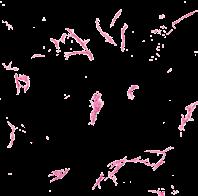
As the COVID-19 pandemic held us all in place for a bit, many took up new hobbies and renewed old ones to fill the time.
Wheaton Professor of Psychology Michael Berg returned to a love he developed when he was an undergraduate: crossword puzzles. Only this time, he began creating
ACROSS
1. “B,” “D” or “EEE” on a shoebox
6. Touchdown, as a plane
10. Poses a question
14. Cherish, as your alma mater
15. Small matter in Introductory Physics
16. Wheaton’s “Taylor and ___” honors program
17. Wheaton performers who really “steel” the show?
19. “You’ve got to be joking!”
20. Swiss artist Paul
21. Actor Brynner
22. Pumpkin-like plant that can be made into an instrument
23. Wheaton performers whose humor can get really “cheeky”?
27. “Bravo!”
30. Star in Orion that anagrams to the offspring of a tiger and lion
31. Doughnutshaped surface
32. Rains heavily
34. Fiscal executive: Abbr.
37. Make small talk
38. Got some Z’s
39. The “Big Easy,” in brief
40. Take more than one’s fair share
41. Separated
42. Indian spinach dish often served with paneer
43. Small bit of land in the sea
45. Birds associated with Poe
46. Wheaton group
his own, drawing on skills he learned from a puzzle construction course he took—29 years ago. He has become so good at it that several of his crossword puzzles have been published in The Boston Globe and The New York Times
We asked him to create the puzzle
whose performers may also come together as one Trybe?
50. Culture’s beliefs and values, as you might discuss in an anthropology class
51. URL ending for many nonprofits
52. Island near Java
56. Healthy grain common in cereal and muffins
57. Wheaton performers who really click as a group?
60. Mosaic piece
61. A long time
62. 1/16 of a pound
63. “Do the Right Thing” pizzeria
64. Focal point in math or botany
65. Spring break and finals, for two DOWN
1. One way to get on base (101 times for Jenna Rocha!)
2. Pastoral poem
3. Top of the old observatory, architecturally
4. Auditioned (for)
5. Farm female
6. An easy two points, in Haas
7. Coral island
8. Oui’s opposite
9. Private online chats: Abbr.
10. Cozy corner
11. Wheaton’s first president and chapel namesake
12. Brand in the soup aisle
13. Mails
18. Connecticut town associated with a tick-borne illness
22. Jobs for a band
24. Tax agency
25. Blow, like a volcano
26. Gossip, in slang
27. Participate in ART 315 (making prints using a metal plate)
28. Neighborhood in Manhattan or London
29. Residence adjacent
below using Wheaton tidbits as the inspiration for the questions and answers. Test your skills.
Go online to read more about Professor Berg and see the answers to the puzzle.
101 every semester
33. “___ the land of the free...”
35. Caramel pudding dessert
36. Source of acorns for Wheaton’s squirrels
38. Blueprint detail
39. Good color to sport on Welcome to Wheaton day
41. Round at Wendell’s, say
42. Container for cooking
46. Things owed
47. Sunny gathering spaces like the first floor of Balfour-Hood
48. Scooter’s kin
49. Form of most essays

53. Top-notch
54. Good fortune
55. “Beware the ___ of March”
57. Catch some rays
58. In the past
59. Help for a
“My time at Wheaton was transformative. I gained new ways to see the world, new lenses of analysis to understand it and new languages to describe it. I was guided and encouraged by advisors and mentors who lit the way for me to pursue my passions and put my values into action. I met the people who would become my best friends and chosen family. In a time of competing priorities and urgent, intersecting and seemingly intractable crises, my Wheaton education and community are two renewable resources I turn to every day to help cope with problems, contribute to innovative and inclusive solutions, and sustain the radical joy required to keep going. I am proud to carry that legacy forward for future generations by giving to sustainability and scholarships now and naming Wheaton as a beneficiary in my planned giving. It’s never too early
Nicholas Helldorfer Cicchinelli ’14 Grants and contracts accountant, Brown University Wheaton College Founders Society member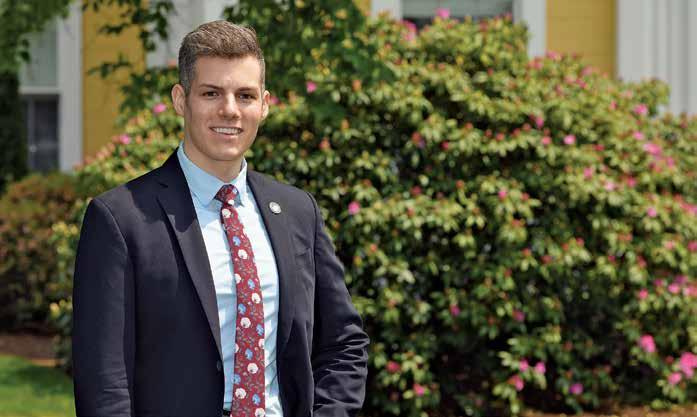
For information, call the Office of Gift Planning at 508-286-3393 or visit giftplanning.wheatoncollege.edu.
KEITH NORDSTROMto plan for life abundantly.”
“In high school, I never dreamed of pursuing science as a career. But at Wheaton, I was quickly encouraged to do research and found myself working with professors Betsey Dyer, Mark LeBlanc and Bob Morris. Professor Morris helped me see science outside of Wheaton and the inspiration that comes from engaging with the international scientific community. That exposure to the wide world of possibilities in science and the interdisciplinary nature of the field are experiences that I continue to cherish and benefit from. Now, more than ever, I feel that interdisciplinary and experiential education is crucial. Wheaton is a special place that fulfills that need and one that cares. So, I’m doing my part to support the college and future students by contributing to the Wheaton Fund.”
Science program officer at the Chan Zuckerberg Initiative, lead for the Single-Cell Biology Program
